#it’s just frustrating that they tend to not let go of their abstract view of trans people
Text
I’m sure those articles written by ex-terfs looking to deradicalise other terfs do occasionally help, and honestly if you’re an ex-terf I think you are morally obligated to berate the bigots you used to call comrades out of their horrendous belief systems, but whenever I read those articles it’s clear to me that these people still view trans people as research specimens to debate over, they’ve just generously shifted over to the side of “i think exterminating this minority group is bad”
#and they also tend to still have reactionary opinions about sex and gender!#like thanks for no longer thinking the transgendereds are all monsters#but your beliefs are not localised to ‘the trans question’ they exist in a web of beliefs about sex and sexuality#and the role of gender in society more broadly#we will probably see more of these types pop up more and more#as more of them realise they either have to fully buy into fascism or leave their movement#and that’s a net good obviously like I’m glad they’re doing that#it’s just frustrating that they tend to not let go of their abstract view of trans people#like we’re still just a topic to debate on twitter#anyway I need to go vacuum my apartment
85 notes
·
View notes
Text
Who Am I?

Openness: 24%
Your low level of openness suggests that you draw your strength from tradition and familiarity. You are down to earth and prefer clear, straightforward direction to abstract or theoretical thinking.
Conscientiousness: 88%
You are good at thinking through your actions before acting on an impulse. This helps you to avoid unnecessary stress or trouble, but it can also lead to workaholic and perfectionist extremes.
Extraversion: 1%
Your low level of extraversion suggests you are likely to be more reserved than other people, enjoy time alone and value maintaining strong relationships with a few close friends.
Agreeableness: 0%
You have a healthy sense of skepticism, and a strong resolve. You don't shy away from making those tough decisions which can't please everyone but still need to be made.
Neuroticism: 34%
You are calm, emotionally stable and are less easily upset than people with high levels of neuroticism. But this doesn't necessarily mean you experience more positive feelings than them.
OUTLOOK: Cool-Headed
Cool-headed people have very calm dispositions, and tend not to succumb to emotional extremes at all. A thoughtful, measured approach can help anyone to keep a cool head in any situation, but too much emotional stoicism can seem distant and unhelpful to other people. It's important to be sure that your good intentions and suggestions come across as just that.
CHARACTER: Driven
Driven people tend to be concerned primarily with their own needs and desires. They are prepared to work hard on achieving them and always keep their eyes on the prize. You may fall into this category if your single-mindedness sometimes means that you can easily become uninterested in other people if you don't think they'll be able to help you achieve your own goals.
SELF-CONTROL: Determined
You keep your cards close to your chest and usually seem very laid back, but you know exactly what's going on around you. When you take offence at something you may not show it there and then, but you're likely to seek a way to even the score somehow. Be careful to maintain a sense of proportion and think about how other people might view your actions out of context.
COMPOSURE: Measured
Measured people have a clear sense of their goals and what they need to do - and focus on - to achieve them. They tend not to be overly affected by external factors and take unexpected changes and opportunities in their stride. It's crucial to maintain a realistic sense of achievement so you don't let your ambitions run away with you.
TASTE: Homebody
You're very content in your own world, or in the company of a select few other people. People who share this characteristic enjoy simple pleasures in life, and are more likely to look for excitement and adventure in their own heads than by heading out into the wilderness for thrills.
SOCIABILITY: Master
People with this characteristic can sometimes be a bit competitive when interacting with other people. Also, they value their privacy and sense of respect very highly, so can come across as quite distant and closed off figures. If you recognise this trait in yourself it’s important to think about the different ways of getting what you want from people, and giving them what they want too.
ACTION: Methodical
Methodical people know how to concentrate on any task they’re set and keep focus on it to completion - so focused in fact that it’s impossible to distract them. Your slow and steady approach may frustrate some people, but their concerns will always be allayed when you deliver your work on time and on spec.
ATTITUDE: Disciplined
People with disciplined attitudes have strong and firm beliefs about things like society and morality. For them, there is a right way of doing things and a proper way to behave, so they support firm discipline when people step out of line. It sounds like you follow the rules and you expect everyone else to follow them as well.
PROCESS: Organizer
Organizers tend to be extremely methodical and diligent in their approach to work. They like to stick to the rules of the game, but this can mean that they lack imagination and creative flair at times. You may prefer structured learning to free thinking and like to have a clear sense of the start, middle and - crucially - end of a project.
RESILIENCE: Practical
Practical people are unlikely to be derailed when they come up against difficulties. Rather than focus on any negative emotions that might be thrown up, they prefer to push them aside and focus on concrete actions and problem-solving, that will help them overcome the situation. Having faith in your ability to get through things is key.
0 notes
Note
a thing about your headcanons that really intrigues me is that, much as Knuckles seems to have originally been done as a contrast or rival to Sonic back in the Genesis days, your take on them has a opposite approach to the responsibility they feel, but done in opposite ways. Sonic runs from responsibility and doesn't want to think about it, while Knuckles feels guilty about NOT being responsible to an extreme, and since people don't often deal with how they're similar, i really like this
Honestly, this is a thread that is not exclusive to Sonic and Knuckles, but actually ties in heavily to a major theme I'm considering and working in Worlds AU.
Basically, "freedom" has always at least nominally been a theme associated with Sonic. It's in his motifs, it's in his attitudes, it's the quality that people tend to envy when they compare themselves to him- whether that's Knuckles who feels bound by fate and obligation, Tails who feels like he might not be enough or can only keep up, Amy who dreads the drudgery of her ordinary life by comparison. Hell, one could say it's even in the many one-off characters who are introduced with Sonic blowing into their life, changing things, inspiring them to grow, and then leaving- Elise, Merlina, Chris Thorndyke, Chip, Shahra.
But it's a theme that's kind of been weakened in the direction that the games took.
In Sonic SatAM, the concept of freedom vs. tyranny was rife in the setting. Robotnik had his boot down on 90% of the world and the remaining pockets are either actively dwindling, or struggling along as best they can through limited resources. All characters are- at any time- in danger of losing specifically their freedom; not their minds, but control of their bodies. And it's a compelling hook.
But the gameverse has very long not been that, and since Sonic Adventure, the world of the games has been very metropolitan. There's a bunch of cities and countries and everybody's going about their daily lives and Eggman's still a wannabe conqueror but he's now become abstracted, a supervillain, who might have this big scheme or that, but- basically until Sonic Forces- we have never had Eggman really decisively in control. And in his absence, there are not really ever any consistent or clear threats to freedom except that, yeah, we guess if we let someone like Solaris or Perfect Chaos or Black Doom run wild long enough that would kill people and then nobody would be free, but... that's an abstract and inelegant way to speak to one of your main center themes.
(and I personally don't like Forces basically trying to reinstate- even if temporarily- the SatAM status quo, even if I think some people like the IDW comics have done interesting things with that, but that's my personal relationship with the character of gameverse Eggman and how I view him distinctly from SatAM Robotnik, as absolutely iconic as the latter is)
I don't think you need an encroaching dystopia per se to make a meaningful discussion out of freedom- I think using the modern gameverse's more colorful, populated world opens up a lot of possibilities for that. So, a major thematic thing I've landed on is that abject tyranny- while the easiest 'threat to freedom' to scan and oppose- and an important one!- is not remotely the only thing that challenges freedom.
A big thing is responsibility.
Responsibility is the thing that most of us sacrifice our freedom to on a daily basis. That may sound dramatic, but it's true; we may have other reasons for it, but we don't just run off somewhere else or go have an adventure or leave our job because we feel responsible to things. And responsibility isn't a bad thing- it's good to feel reliable or trustworthy. If you enjoy your job or your coworkers, you want to do well at it. Having a house is a responsibility, we take care of them. Having a relationship of any kind is a responsibility; so is having kids. If none of us were ever responsible, society would fall apart and we'd all live lonely lives. Moreover, we'd have very little power- ironically a lack of responsibility can lead to a lack of freedom in some regards.
But also, it's very easy to give too much of yourself away and not have any left. I mentioned before that many characters are consistently depicted, across many continuities, idealizing Sonic- because Sonic's free! Sonic doesn't buy groceries or pay taxes or do boring stuff, he certainly isn't stuck in a frustrating or isolating situation, and this can even tie into one of Sonic's major themes- he refuses to be talked into accepting lesser evils.
In Sonic and the Black Knight, Merlina tries to explain to him why she's using Excalibur's scabbard- why she's doing bad things, trying to justify it that she can't just let the kingdom end, even if that means needing to twist it into a horrible place to live- to which she at one point, in frustration, asks if Sonic understands, to which he responds, "No, and I don't want to."
While it's not exactly a perfect moral stance (those don't exist), there is something to be said powerfully for the idea that Sonic as a person has a certain rejection of responsibility as a chain to let bad things happen. He rejects loyalty to a thing that drives you into cruelty.
And this is really interesting, when we consider- specifically in the very first game that featured Shadow and featured him explicitly as a dark antithesis to Sonic- that is exactly what happens to Shadow.
Shadow is not, by default, an amoral person. Pre-trauma, we see that he doesn't want to hurt others, and frankly, as much as "ow the edge" circles (and is somewhat warranted), we can often see that he's standoffish but fairly civil; someone who is dealing with a lot of stresses and problems, but doesn't often relish hurting others unless he's already desperate, frustrated, or looking for an outlet or solution. And in adventure 2, Shadow is led into nearly ending the planet on account of loyalty; to the idea of Maria, to what he believes she asked him to do (and what he believes is owed to the people who killed her)
It's kind of conspicuous that if you think about it, most of Shadow's arcs in various games that focused on him are about questions of what's owed- to him, or to the world. Does he owe a debt to Eggman? Rouge? Black Doom? Gerald? Maria? Does the world owe him a debt of anger and pain to be paid back in vengeance, or, is he the one who owes the world a chance? Does he owe himself a chance? These are questions of Responsibility.
So to bring this back to Sonic and Knuckles, I think that's an interesting context to set them apart, because both of those two definitely have a special relationship with the Chaos Emeralds. Knuckles is the guardian of the shrine that doesn't just have positions for the Master Emerald, but all seven smaller ones as well; and Sonic... well, Sonic consistently and regularly does stuff with the chaos emeralds nobody else does. He transfers super forms to other people, or even awakens them in people who haven't done it before (as implied with Burning Blaze in Sonic Rush). And at least according to Sonic 3&K, his arrival (?) was foretold.
But Sonic... does not feel responsible about the chaos emeralds. If something's happening with them he wants to know but it's about curiosity. When the chaos emeralds are corrupted, tarnished, and lose power, Sonic... juggles them, while he's confused about his own (related) corruption. It's weird, it's concerning, but it's not an obligation. He gets distracted buying ice cream in the same scene.
By contrast, the only time Knuckles feels confident shattering the Master Emerald, it's as an obligation- he has to protect it from Eggman even if it creates more work for himself, and he later freaks out and nearly crashes the shuttle he and others are on when a near-miss scatters the master emerald pieces he's collected across the ARK. I can only imagine half of the plot of Sonic Unleashed would've given Knuckles an ulcer if he'd been around for it. You did what to the Chaos Emeralds, Sonic????
Basically, I think while freedom vs. tyranny is definitely Sonic's brand, you can have a lot more fun and shore up the thematic strength by also factoring in "responsibility" as a secondary theme and this strengthens or illuminates many characters and their arcs.
50 notes
·
View notes
Note
I suppose because politics is what means I have no future of any kind left, so it's hard to be silly about it. And I seem to have landed myself in a sector of social media filled with people who are very smug about how smart and nihilistic they are, and I hate all of you with the hatred that only a miserable, powerless person can feel.
I don’t buy it. Unless you are quite literally scheduled to be executed at dawn, “no future of any kind left” because of politics is catastrophizing. People in very dire circumstances the world over often manage to build some kind of life for themselves; it may not be the life they want, and the suffering they endure because of the circumstances they are limited by should not be dismissed, but to say that someone in such adverse conditions has no future is to infantalize them and deny them the agency they do have to shape their life to some extent.
And this is an insight I’ve found important when dealing with depression in myself: even if one’s catastrophizing is not irrational (say, you’re a queer person stuck in an extremely homophobic environment, at minimum for the next 5-10 years), that does not mean it is useful. To put it another way: circumstance might justifiably make you angry and sad and frustrated. That may be rational. Deciding, in the face of that anger and sadness and frustration, to surrender to it is not rational.
So--assuming that you are not a political dissident due to be executed, nor suffering from a terminal illness which somehow for political reasons cannot be cured (if either of these things are true, you have my sincere condolences)--I have to say, this ask reeks of someone who’s depressed. If you are depressed, you will always be able to come up with reasons why happiness is unattainable for you, due to circumstances entirely out of your control. This is not a crazy thing to think, because if you are depressed and not treating that depression, most if not all the things you try to do will not solve your unhappiness because they are usually orthogonal to what is making you unhappy. Your very ability to accurately imagine future happy states and what might bring them about is suppressed by depression; for instance, you might, if you are depressed and you know it, rationally understand that exercise often helps with your depression, but be unable to motivate yourself to exercise because the intuitive link between if I do X I will feel better is broken by an internal forecasting system that refuses to spit out predictions other than “nothing I do will help with anything.”
A depressed state is not a psychotic break--it doesn’t cause you to lose touch with reality--but I think depressed people would sometimes benefit from treating it like one, because it does subvert your ability to accurately model the world, and therefore you can’t trust your own ability to reason or intuit about certain topics. I have both experienced this from the inside, and seen it from the outside: friends whose depression causes them to believe they are unlovable, and thus that nobody loves them, even when told (and shown) repeatedly that they are very much loved, and very important to the people around them.
In fact, you remind me of this post: depressed and anxious people who notice politics is depressing and anxiety-inducing, and that depressing and anxiety-inducing problems confront the world and society, and therefore conclude that their depression and anxiety are a rational and reasonable response to the world. But that doesn’t follow at all! A lot of responses to a depressing and anxiety-inducing environment are more useful that shutting down and withdrawing, or letting yourself be paralyzed; and even if there are negative external factors in the world affecting your life, if you have nothing in your life that is a sufficient source of joy to offset these things at least somewhat, then you have problems sufficiently severe that I don’t think your depression or anxiety can be laid at the feet of the world at large alone; more likely, you’re dealing with shitty personal circumstances, and these are far more likely to be tractable to your individual capacities than, like, all of climate change. And if you do have some sources of joy in your life, you can cultivate those further.
To put it another way: humans are very bad at reasoning about things on large scales or over large timelines. One reason we’re slow to solve problems like climate change is that we tend to be pretty blasé about remote and impersonal problems, which is actually often useful as well--because it means we’re capable of adjusting our hedonic barometer to create joy even in catastrophic circumstances. If you are constantly worried about big issues like climate change or the Trump presidency to the point where you can never do that, then the conclusion you should draw isn’t that you’re a uniquely rational human being with a uniquely accurate worldview, it’s that your brain is broken and you should not trust your intuitition.
Emotional states are not rational models of the world. They are tools our brain uses to motivate certain kinds of action. They probably have their origin in our social evolution, but this means they are extremely untrustworthy when it comes to complex, large-scale, philosophical, or impersonal issues, because these are not scenarios our brains evolved to handle before the advent of high-population, highly-stratified societies.
Now, I realize it’s hard to convince someone they are depressed and/or should seek treatment by rational argument (lord knows I’ve tried in the past!), because after all, if we were being perfectly rational, we would not feel depressed. We wouldn’t feel anything; again, emotions are contingent tools, not highly rationalized responses to the world! So I won’t belabor this point any longer. Instead, now I’m going to get annoyed with you.
Because here’s the other thing depressed people do--and I have done myself. They see people who are not depressed, whose hedonic barometers are functioning normally, and capable of experiencing joy even in arguably (or inarguably!) shitty circumstances, and they get mad at them. How dare you be capable of laughing at a joke, or sharing a meme, or having a nice day, when everything is so bad!
This is a common response, not only from depression, but also I think from grief, or fear, or trauma, or lots of other things. But it’s bullshit. I’m sorry, but you don’t get to demand that everyone feel your suffering as acutely as they feel their own. You don’t get to demand that just because you’re a pessimistic ball of frustration and anger that everyone else be, too. You get to--and ought to--demand that people treat you with empathy and respect, but that doesn’t mean they don’t get to make jokes about topics you find depressing as hell. Yes, even topics that personally affect you, and may not personally affect them (though, of course, a lot of times people assume the person making the joke isn’t personally affected by the topic, when in reality they are and the joke is a way of relieving stress and coping with frustration).
That calvin and hobbes meme I reblogged is an extremely generic political compass meme; the only relevance it has to the world today, I suppose, is acknowledging that, like, politics is a thing that exists. If you’re upset by that--how dare people laugh at politics, the source of all my problems--you’re being a dick.
And this leads my to my final point, which is this: while we are all of us owed compassion, we also owe others compassion. And people caught up in their own anxiety and depression and anger often don’t see the way their emotional states impose costs on the people around them. They often treat the people around them badly--worse, at any rate, than they normally would--and react defensively if this is pointed out to them.
I’ve done this. I have friends who have done this. I get it. It doesn’t make someone a horrible person! It doesn’t meant they deserve to feel the way they do. But it does create the second half of a twofold moral obligation. You see, I believe that the, call it “utilitarian selfishness” view, is essentially correct: if all humans are of similar moral worth (they are), and you can only help one person (often true), and that person is yourself, it is no less moral to help yourself than it is to help someone else. This is usually framed as a grant of permission: “you are allowed to be selfish sometimes.” But it’s also an obligation: “you should not be a dick--even to yourself.” You have a positive obligation to care about your own suffering! And you have a positive obligation to try to reduce the costs your suffering--your bad mood, your depression, your anxiety--imposes on the people around you.
Because I’m not a smug nihilist. I actually believe, with embarrassing intensity, in a large number of abstract principles. And while I believe circumstance or injustice can conspire to make people feel miserable and powerless, and I have the utmost sympathy for you feeling that way, no one is so omnipotent as to be able to truly excise our power to do something with our life that is rewarding to us, no matter how modest. Your subjective feeling of misery is not license to be a dick to people, or to misrepresent them or their motivations. And if reading my tumblr (or anyone else’s) makes you miserable, you have a positive moral obligation to stop, because you’re being a dick to yourself, which is no more justifiable than being a dick to me. And being a dick to me because you don’t like my Tumblr, because you’re miserable and I’m not, is pants-on-head stupid.
I, too, have been so convinced of my misery and powerlessness, and so utterly convinced of my inability to make improvements in my life, that I have yielded utterly to the feeling of myself as a despised, helpless, wretched thing. You can spend years in that state. A lifetime, even. I suppose it relieves you from the burden of having to try, which is a tiny shred of comfort when the climb up the hill seems so steep. But I have found that in the long run it brings no other relief; there’s no regression to the mean, just an endless prolongation of misery. It required some courage, and not a little determination, to try to climb out of that pit. Sometimes you struggle. Sometimes you fall back in. Sometimes it’s easier to believe there’s nothing beyond that place of unhappiness. But there is, and you can get there, and the choice of whether or not to reach it lies only with you.
#if you are in fact due to be executed ignore this#and you have my deepest condolences#but in that case how did you get on tumblr???#Anonymous
88 notes
·
View notes
Note
If it's not to much trouble may i have a (male) host club matchup please. Im a Capricorn, my mbti type is infj-a/infj-a. I tend to be shy around new people but I can be somewhat loud around people who Im close to. My pronouns are she/her. I have long-ish length brown hair, green eyes, wear round glasses and have pale skin. I have a lot of freckles. My height is 5'0 I like to read books and also cook and bake food. Im not very athletic and im not a big fan if sports but I love to go roller/ice skating. I also have been playing the violin for 6 years. And I like to garden. I also like to watch nature/animal documentaries. I love animals and in planning on becoming a wildlife veterinarian. Some things I dislike are people who bend/ruin my books and people who talk over me when I try to speak. I hope this is ok, sorry if I spelt anything wrong. I hope im not bothering you :) also I hope the information I sent in is ok :)
[🌄 @armin-ocean-eyes requested one (1) regular Ouran High School Host Club matchup. I have just the ingredients for that! Sit tight while I get to work.🌌]
Taurus INTJ-t here 😗✌️So,,,,hi I guess! Also, since you are two (2) inches shorter than me, I am legally obligated to adopt and protect you. I apologize if I use gender neutral pronouns for you. That’s just my default!
Anyways, I have just the guy for you:
\/\/\/\/\/\/\/\/\/\/\/\/\/\/\/\/\/\/\/\/\/\/\/\/\/\/\/
🌓Kaoru Hitachiin🌓
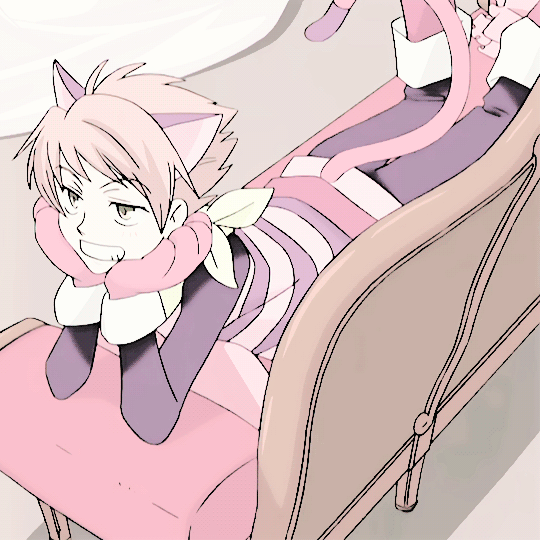
(Please tell me this is Kaoru, gifs are stupid 😭😭😭)
🌱Humble Beginnings🌱
You are the daughter of the C.E.O. of a successful publishing agency
You were no stranger to the wealthy lifestyle. But, your parents made it a point to not let you become vain, lazy, or unsympathetic to the human condition
I’m not too sure if there’s an actual term for this, but a thing I like to call “right-brained intellectualism" was emphasized in your household. Basically, the ability to classify complex human emotions and not only understand them. But, view them through the lenses of objectivity and abstract concepts (Hence, the “right-brained” part)
The goal was to instill curiosity in you to explore how different personalities act in different situations and why. This could ultimately help you guide your social interactions in the future
(Forgive me if I'm speaking over your head! This information serves a purpose I promise!)
So, essentially super-charged EQ
But, here's where it comes in handy:
Due to your reserved tendencies, you weren't that high on Ouran's social ladder. Especially in middle school. You tried your best not to pay that fact any mind, reminding yourself to always pack an extra novel in case you finished your current one during the day
But, the (sort of) benefit to having so much time on your own, was that you had plenty of time to observe the students around you. Their actions, quirks, and relationships
Two particular oddballs caught your eye
Brothers. Identical twins that seemed to want no company than that of each other
You knew they had names. You knew what they were. But, not being able to pin a name to an identical face made that fact lose meaning
They didn't have any friends (Which wasn't a hyperbole). But, neither of them seemed shy, like you were
Rather, they were the asocial types. And you saw secondhand that they went out of their way to keep their little world for only them
You had accidentally seen one day what they did to girls that dared to confess their feelings for one twin. And that only reaffirmed that trying to figure out why the Hitachiins acted the way they did was too much pressure for your meek little heart
But...still.
There weren't any surface level answers to reach for that could calm your curiosities (Other than just passing the Hitachiins off as jerks and moving on). You could tell their reasoning was much more complex
And that. Frustrated you
To ease your mind, you wanted to start off small: Learn which is Hikaru, and which is Kaoru
One day, just before the lunch period started, you had finished your current novel. But, when you reached for the extra book in your bag, it had ✨vanished✨
You panicked a bit. You knew you packed the book. You re-checked earlier in the day!
The teacher unfortunately noticed you looking around like a lost puppy, asking what was wrong
"Mm?? Oh- uh...I just lost my book. It's, y'know, it's fine! I'll just...look for it later..."
The teacher didn't pick up on how embarrassed you were, asking the class if someone wanted to help you look
You were surprised when someone actually raised their hand
And just your luck, it was one of the twins, who turned to his brother and reassured him that they'd see each other at lunch
You (lowkey paralyzed by fear) followed the Hitachiin's lead, waiting until the rest of the class had left the room to begin your search
But, as you started to sift through the shelves in the back, you felt the boy tap your shoulder
And there it was in his hand, the first edition book on botany you had gotten for your birthday not too long ago
"You...you found it already??"
He rubbed the back of his neck, more bashful than you would've pegged him for
"Kind of…? I took it during class. I thought your reaction would be funny, but it was sort of just hard to look at. It would've just been cruel to embarrass you more in front of everyone."
"Oh...well, thanks for telling me at least."
The boy raised an eyebrow, your reactions catching him off guard once more
"You're not mad?"
"Not really. You realized your mistake and that's more than some can say. So, I can forgive that."
"Hm...well, I should get going. I can't keep him waiting!"
Before he left, you called out to him, asking for his name
"Hm? Kaoru."
🌳Flourishing Love🌳
The start of you and Kaoru's romantic relationship actually began in high school
The (in)famously idealistic Tamaki Suoh had approached you, Hikaru, and Kaoru to be a part of his new "host club". The twins as a part of the service, you as the manager (To garner male financial support, of course :D)
Since you weren't involved in a club anyway, you agreed to join next semester for your first year of high school
Once Haruhi came into the picture, you became fast friends. Seeing as you were both practical souls, if not intellectual
Through your friendship with Haruhi, you got closer to the twins you were so afraid of all that time ago
Especially Kaoru, the twin you had spoken to first
Both of your crushes formed rather fast as you got to know each other personally (And since Hikaru was already starting to take interest in Haruhi)
Kaoru had fallen for the way you never made face-value judgements of people. Like how you were so understanding about his dumb prank on you just last year
He learned to love the bright rays of passion that shone through your timid exterior. The way you talked about the things you loved like they were the greatest things in the world. You always made your case with such conviction, and Kaoru couldn't help but believe you all the way
You, Haruhi, Hikaru, and Kaoru were hanging out in the courtyard one day, and Kaoru had managed to get you to talk about the flora and fauna in the area (Which quickly segwayed into how you loved gardening and caring for animals)
All the while, Kaoru intently listened, staring at you like you were the only person in the world
During a pause in your avid canine classification spree, Kaoru picked up a few cornflowers that had fallen from a bush, putting them in your hair and behind your ear
While you were blushing up a storm, Kaoru bluntly, but sweetly, confessed
Hikaru and Haruhi looked on, endeared that the two sweetest souls in their little group had finally gotten together
In your relationship, you manage to draw out the more relaxed and mature side of Kaoru's personality
(Though, you always get a good laugh out of his more cunning and mischievous side)
You always affirm to him that he can enjoy both sides of being a twin, and being his own unique person. He doesn't necessarily have to choose
Kaoru definitely takes advantage of your height difference, using you as an armrest at the most inopportune times
He loves to kiss each and every one of your freckles (At least, on your face and neck). No matter what you think of them, he sees them as little targets to go for when he wants to shower you with love
But, like a respectful boy, he always lets you take off your glasses first if you need to
You guys went ice skating for your first date! Since it was your hobby, you paid for skating, and Kaoru paid for food afterwards. Kaoru knew how to skate, but pretended not to so he could have an excuse to hold your hands
Kaoru found out about your violin training later in the relationship, immediately teasing you about playing for one of the host club's sessions at some point
He has undoubtedly picked up a disturbing amount of animal facts from you and the documentaries you watch. He shares them with the host club to get disgusted reactions from them, and flattered smiles from you 😊
Y'all are just so freaking cute together, I need to chug salt to get the sweetness out of my mouth ❤️
\/\/\/\/\/\/\/\/\/\/\/\/\/\/\/\/\/\/\/\/\/\/\/\/\/\/\/
[🌌 There you go bud! That’s one matchup for the road. Hopefully it lasts for a while, but if it doesn’t, feel free to come back! I’d be thrilled to see you again.🌄] —Reagan
#caravan commodities#special bindles#matchup#armin-ocean-eyes.traveler#armin-ocean-eyes.request#ouran high school host club#ohshc matchup#ohshc matchups#kaoru x reader#kaoru hitachiin x reader#this one got away from me a bit 😅#not me never ending up using pronouns or gendered terms 💀#except for daughter but still#hope you like it!!!
21 notes
·
View notes
Note
I'm not sure the best way to ask this but I'll try, sorry if I send a bunch of anons. I got into a discussion about what constitutes "bad writing" and as a writer who views writing as art, I personally have a hard time actually saying any writing is bad (even when it is literally hard or cringe to read lol). I personally tend to read stories and if there's stuff that doesn't make sense or lacks continuity, I tend to naturally change the story to make sense/be "better" (for myself). (Cont)

It’s a crazy complicated subject, isn’t it? I too view writing (any craft, really) as art. Which, for me, doesn’t mean that writing can’t be bad, but rather I acknowledge that “bad” is a subjective label and there’s no art in the world that’s “bad” to every single person. Which is why censorship can’t exist. The art that one group deems “bad” in an ethical manner can’t have the power to destroy it when another group needs and thrives on that art. (And I’ve spoken before about that careful balance between allowing art to exist/allowing for its creation but making your morals known regarding individual pieces. e.g. “I’m not going to blindly fight against everyone who creates kink art but if you created something that, say, fetishizes a group in an offensive and potentially dangerous way, people have the right to speak up about that.”)
But here we’re not talking about “bad” moral writing, but rather “bad” entertainment writing. Even though, in reality, the two are rarely separate issues. But let’s assume they are for a moment. Yes, I wholeheartedly agree that from one perspective “bad” writing simply does not exist. The cringeiest YA novel is going to be some teen’s favorite book. The song that sounds like nonsense noise to you may be another’s anthem. Someone fell in love with that fic, or that drawing, or the lopsided sweater you knit. So right in those examples we can see how “good” art often depends on:
Your relationships (a “bad” drawing by a child is going to mean something to their mother)
Your age (people adore books as teens that they later realize were “bad,” but it wasn’t “bad” according to who you were at the time)
Previous skill level (if you just started knitting and you could barely manage a scarf last year, that sweater is “good” now, comparatively)
Experience (someone with very little knowledge of animation might be blown away by a show that’s sneered at by someone who consumes the medium regularly)
What you as an individual prioritize (when people talk about a “good” story one might be referencing the plot, the other might be referencing the world building, the third relatable characters, and everyone has a different list of requirements for what makes a “good” tale)
Something unidentifiable based on our tastes that, notably, are always changing
So obviously art is subjective. However, when we’re talking about art in the media that’s meant to be consumed by the masses, we need to introduce two crucial elements:
This is art that (usually) someone paid for, in one manner or another. Producing this art was someone’s job. Thus, there are expectations attached to the experience that help people determine whether it’s “good” or “bad.” If you paid for a show that implied it would have solid continuity and then it failed to produce that, that’s now an issue between a buyer and a seller. Like going to a restaurant, paying for a burger, and getting a sandwich instead. We can argue that they’re very similar foods. We can argue that the sandwich is still a delicious food to receive. We can argue that you have to power to go home to your own kitchen and make a burger yourself if you’re that picky... but at the end of the day you ordered something (or, to be clearer regarding media, were encouraged to expect something) and then didn’t receive it. That makes people mad. Or at best, disappointed. People may naturally be inclined to do the work of the writers tasked with providing their entertainment - making things “better” as you say - but that shouldn’t be a requirement. When I pay someone to make my food it’s not a part of the unspoken contract that I will doctor the meal extensively until it resembles what I thought I was paying for.
Though subjective, there are types of art that the majority of people tend to prefer. Consistency being a major one. Are there abstract forms of art that deliberately work to confuse or frustrate viewers and do people find that engaging? Absolutely. Do the majority of people want to work hard to follow/understand/explain the story they sat down to watch at the end of a long day? Nope. It’s the safe bet of “Yeah, some people might not care if we retcon this but more people are probably going to be upset that we can’t follow our own story rules.” That consistency spreads to everything, including things like character arcs and endings. If you look at controversial shows like How I Met Your Mother or Dexter, when people say “This was a bad ending” they rarely mean “No one could ever like this conclusion.” Rather, they mean that “The vast majority of us expected something based on what you previously produced and then you failed to provide that. This doesn’t make sense and thus we feel lied to.”
The purpose of (most) stories isn’t to produce feelings of betrayal, anger, frustration, and disappointment in your audience. So if a story does produce those feelings via all that you mention - lost potential, lack of continuity, numerous mistakes, etc. - then it has failed to do what (most) stories seek to do. Again, not all stories are like this. Many do try to produce such feelings. But for the majority of mainstream works if your audience doesn’t experience feelings of happiness (or catharsis) and satisfaction... then the story is “bad.” In the way that a car that won’t run is “bad.” The car might still look good and maybe you can use it for something else if you put your mind to it, but it has failed to complete its purpose as a car.
That for me makes a “bad” story. It has failed to function as that particular type of story should. When we sit down to something like RWBY we have certain expectations. They’re produced by what the show has already introduced, its genre, its tone, what RT says during panels, how much money the company has, etc. Expectations like “Characterization will remain logical and consistent” or “If you introduce this concept you’ll come back to it,” or “We’re not going to have a whole bunch of animation mistakes.” Failing to meet these expectations doesn’t produce an objectively bad story - someone out there will like it - but it does produce a “bad” story in relation to what the majority of audience remembers had hoped and expected the story would be. Every story in the world is compared against its potential and the expectations it produces along the way (even if one of the expectations is a story’s ability to creatively undermine expectations: “We thought we were going one way but then there was a twist. Crucially the twist makes sense so that’s still satisfying, even though it’s not what we thought we’d get). How well the story manages that determines whether the majority considers it “good” or not.
13 notes
·
View notes
Text
Meta: Heinz Doofenshmirtz and Romance
Okay so I’ve been marathoning PnF (I got sick over the weekend so PnF is my comfort show) and I’ve noticed that many of Heinz’s schemes revolve around romance in some way so I thought it would be interesting to discuss this aspect of his schemes.
Let’s get started!
Romance
Heinz has abysmal luck when it comes to romance. Heinz’s upbringing left him with many emotional scars that make it difficult for him to interact with people, especially in the romance department. So to kick this off, I thought I’d start by looking at Heinz’s views on romance, which can be summed up well in the episodes Chez Platypus and What Do It Do?.
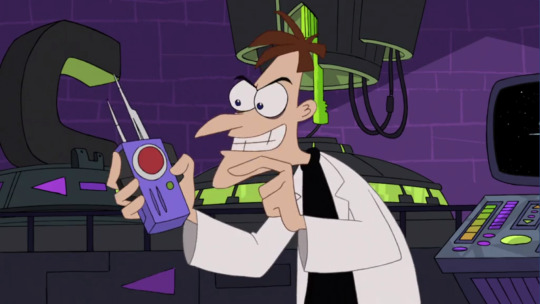
“I'm so tired of all these happy couples around me, romantic and laughing, mocking me with their happiness. Well, not anymore. My De Love-inator satellite will eliminate the feeling of love in the entire Tri-State Area. All I have to do is press this button. It would be so easy to press it right now. It would be so simple, but, you know, I've got a date tonight, and I like to stay optimistic. But if we don't hit it off, I'm definitely gonna ruin it for everyone else.”
Honestly, romance is such a complicated thing. Practically all of media revolves around romance (regardless of how well or poorly written it is, the point is that it’s nigh unavoidable no matter the type of media you consume). And if you’re dating luck is as poor as Heinz Doofenshmirtz’s, it’s pretty understandable as to why he’d be bitter and jealous about it.
He sees couples doing couple-y things, like going to a nice restaurant or going to concerts together, and desperately wants that to fill a void in his life. But it never works out, leading him to blame romance as a whole.
We’re gonna come back to Chez Platypus later.
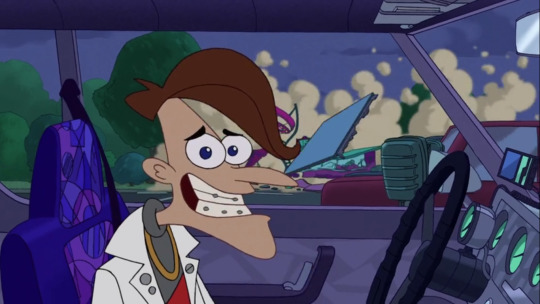
“I wonder what would make someone want to build something to destroy romance in the first place.” -Isabella, What Do it Do?
In What Do it Do, unpleasant reminders of a teenage Heinz’s disastrous drive-in date with Linda cause him to build a robot to identify and destroy romantic elements from situations where romance is bound to happen.
Ironically, the anti-romance bot Phineas and Ferb reverse-engineered falls in love with the original anti-romance bot Heinz built, and they wind up flying off into the sunset together.
While romance can be infuriating and frustrating and confusing, the fact is that love (whether romantic, platonic, or familial) is here to stay, and as Newton’s First Law states, energy cannot be created or destroyed, only converted into different forms.
Heinz’s methods of casting blame are interesting, to say the least. Any parent-related trauma is taken out on Roger or an associated item such as lawn gnomes, rather than his own biological parents even if it would be more justified to go after them instead. Abstract concepts such as romance and handsomeness are targeted for causing Heinz’s insecurities to rise up. Heinz is inclined to blame himself if something occurs that was beyond his control, but he needs prodding to take accountability for things that actually were his fault.
Heinz’s trauma doesn’t translate well into a romantic life. For one thing, the romantic partner needs to understand Heinz as a whole person and not just base their attraction off looks or interests, which is likely why Heinz’s main method of dating post-divorce doesn’t work out.
The Dating Game
Online dating profiles are what Heinz typically uses to get dates (ex: Get that Bigfoot Out of My Face, Chez Platypus, Mindshare). But this method can only tell you so much about a person.
You would put things like ‘I love dogs’ or a sexual preference on a dating profile. Not ‘I hate my brother because he got all of our mother’s love and attention’ or ‘I was disowned and had to live with ocelots for a while’.
Online dating profiles are meant to make you an appealing prospective date, and putting any emotionally scarring backstory-related stuff would definitely turn away the majority of interested parties. If Heinz ever did put backstory stuff on his dating profile, this would probably wind up attracting people who view Heinz as a project to be molded to their liking, instead of accepting him wholeheartedly with personality flaws and all.
Going back to Chez Platypus, while there was a rather nice song about Heinz and his unnamed date’s budding attraction, it was probably for the best that the date was zapped by Heinz’s anti-love inator and left him.
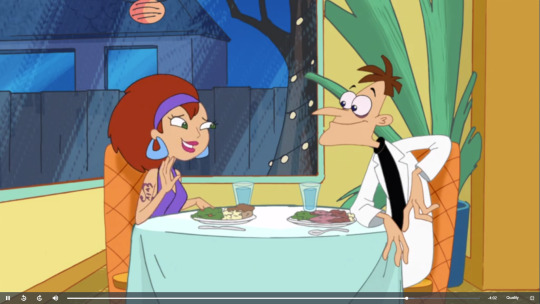
For one thing, Heinz’s date really just lists superficial qualities about what she likes or doesn’t like about Heinz. She prefers tall, blond men, but she also likes windswept looks, lab coats, and evil.
Even if this relationship did make it past the first date, I can’t see Heinz being ultimately happy with her in the long run. For one thing, liking evil is their common ground. However, Heinz isn’t evil at all. He just puts on a huge show about it. The date might not like that, or she could possibly enable Heinz’s worst habits.
What Heinz needs is someone to challenge him, someone who’ll listen, someone to comfort and help him, someone to trust and love and accept him for who he is.
Even if Heinz was fully aware that the above qualities are truly what he’s seeking, those needs aren’t exactly something you can put on an online dating profile, nor are they something that’ll occur on a first date.
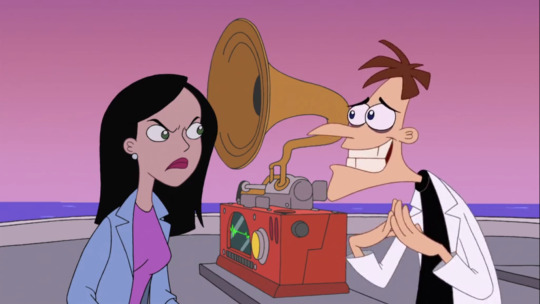
“She left me for that trash-talking 35-ton pile of blubber. And broke my fragile, 10-ounce utterly-too-human heart.”
The Elizabeth-leaving-Heinz-for-a-whale backstory shows that Heinz tends to go to extreme lengths for people he’s trying to impress, though for some reason they never appreciate what he’s trying to do for them. Seriously, if a guy made me a translator so I could understand what my favorite animals were saying, I would be over the moon. The animals could be insulting me but I wouldn’t care because the guy a lot of thought into the gift.
Heinz trusts too easily, especially if he’s trying to impress someone. That’s why it’s so easy to hurt him. They could be threatening to kill him with a missile to the face and he would still put 100% of his trust in them.
Charlene Doofenshmirtz
Despite his many, many dating failures, he did manage to woo Charlene, marry, and have Vanessa. Though it ended in divorce, Charlene is the only woman Heinz has dated who actually cares for Heinz. She encourages Vanessa to have a relationship with Heinz, and cares enough to help support him financially, long after their split.
Charlene says the reason for their divorce was because they wanted different things. While she was unable to give Heinz the deep emotional support he desperately needed, she does care in her own way. And that’s fine.
Which brings us to Heinz’s most successful relationship.
Perry the Platypus
Nemesis bonds are just as sacred and honored as a marriage. They both require time, effort, communication, understanding, disagreements, agreements, and love.
Perry ultimately provides everything Heinz needs, just as Heinz provides the things Perry can’t receive in his family and line of work. Perry and Heinz aren’t perfect. They hit snags here and there, especially in regards to communication.
Miscommunication and trust are the main obstacles Perry and Heinz face. In It’s About Time, Perry was under the impression that he and Heinz were an exclusive nemesis pair, while Heinz thought Perry wouldn’t mind if he fought other agents.
Given Heinz’s history, he’s not accustomed to someone wanting to stick around in the long term for him, especially in an exclusive relationship. His previous longest lasting relationship ended in divorce, so he probably figured it was a matter of time before Perry left, which pretty much leads into abandonment issues.
But once they get past all that and work out the kinks in their relationship?
They support and love each other.
Most of Heinz’s dates occur in Season 1 and early Season 2, where Heinz and Perry were going from nemeses to frenemies, Dating becomes much less important as Heinz begins to consider Perry a friend, family, rock, and angel rolled up into one little ball of unstoppable dynamic fury.
Conclusion
Heinz’s relationship with romance is a complicated one. Sure, he may have suffered heartbreak after heartbreak, but his time with Charlene gave him a daughter to treasure, and Perry is the emotional support and loving companion he wanted all along.
193 notes
·
View notes
Text

✨ Lainey Washington ✨
You're the Navigator. (A methodical organiser) You've got your plan and you've got things in order.
Openness – 27% (Your low level of openness suggests that you draw your strength from tradition and familiarity. You are down to earth and prefer clear, straightforward direction to abstract or theoretical thinking.
Conscientiousness – 99% (You are good at thinking through your actions before acting on an impulse. This helps you to avoid unnecessary stress or trouble, but it can also lead to workaholic and perfectionist extremes.)
Extraversion – 21% (Your low level of extraversion suggests you are likely to be more reserved than other people, enjoy time alone and value maintaining strong relationships with a few close friends.)
Agreeableness – 5% (You have a healthy sense of skepticism, and a strong resolve. You don't shy away from making those tough decisions which can't please everyone but still need to be made.)
Neuroticism – 18% (You are calm, emotionally stable and are less easily upset than people with high levels of neuroticism. But this doesn't necessarily mean you experience more positive feelings than them.)
OUTLOOK ● Coolheaded. Cool-headed people have very calm dispositions, and tend not to succumb to emotional extremes at all. A thoughtful, measured approach can help anyone to keep a cool head in any situation, but too much emotional stoicism can seem distant and unhelpful to other people. It's important to be sure that your good intentions and suggestions come across as just that.
CHARACTER ● Driven. Driven people tend to be concerned primarily with their own needs and desires. They are prepared to work hard on achieving them and always keep their eyes on the prize. You may fall into this category if your single-mindedness sometimes means that you can easily become uninterested in other people if you don't think they'll be able to help you achieve your own goals.
SELF-CONTROL ● Determined. You keep your cards close to your chest and usually seem very laid back, but you know exactly what's going on around you. When you take offence at something you may not show it there and then, but you're likely to seek a way to even the score somehow. Be careful to maintain a sense of proportion and think about how other people might view your actions out of context.
COMPOSURE ● Measured. Measured people have a clear sense of their goals and what they need to do - and focus on - to achieve them. They tend not to be overly affected by external factors and take unexpected changes and opportunities in their stride. It's crucial to maintain a realistic sense of achievement so you don't let your ambitions run away with you.
TASTE ● Homebody. You're very content in your own world, or in the company of a select few other people. People who share this characteristic enjoy simple pleasures in life, and are more likely to look for excitement and adventure in their own heads than by heading out into the wilderness for thrills.
SOCIABILITY ● Master. People with this characteristic can sometimes be a bit competitive when interacting with other people. Also, they value their privacy and sense of respect very highly, so can come across as quite distant and closed off figures. If you recognise this trait in yourself it’s important to think about the different ways of getting what you want from people, and giving them what they want too.
ACTION ● Methodical. Methodical people know how to concentrate on any task they're set and keep focus on it to completion - so focused in fact that it's impossible to distract them. Your slow and steady approach may frustrate some people, but their concerns will always be allayed when you deliver your work on time and on spec.
ATTITUDE ● Disciplined. People with disciplined attitudes have strong and firm beliefs about things like society and morality. For them, there is a right way of doing things and a proper way to behave, so they support firm discipline when people step out of line. It sounds like you follow the rules and you expect everyone else to follow them as well.
PROCESS ● Organizer. Organizers tend to be extremely methodical and diligent in their approach to work. They like to stick to the rules of the game, but this can mean that they lack imagination and creative flair at times. You may prefer structured learning to free thinking and like to have a clear sense of the start, middle and - crucially - end of a project.
RESILIENCE ● Practical. Practical people are unlikely to be derailed when they come up against difficulties. Rather than focus on any negative emotions that might be thrown up, they prefer to push them aside and focus on concrete actions and problem-solving, that will help them overcome the situation. Having faith in your ability to get through things is key.
2 notes
·
View notes
Text
Thoughts re: antagonists
Fair warning: I will be treating “Rhea is an antagonist” as an axiom here to base further discussion on it, if you disagree with that premise then this post isnt for you but im not gonna go into details about proving/arguing it here.
So on the surface Fodlan appears like your standards issue medieval fantasy setting governed by the rulers of the three countries, but it’s actually a sort of post-apocalyptic leftover of a world where advanced technology once existed, a bit like those legends or pseudoscientific theories about a grand, but sinful civilization before the biblical great flood or Atlantis. Man Grey Proud, wiped out by divine punishment yadda yadda resulting in a setting with two main antagonistic forces that have control and shaped the current state of Fodlans politics through the centuries and have been locked in a costly eternal war:
There’s the remaining Agarthans who want to destroy the surface dwelling civilization AND the Nabateans to rule the surface themselves (which makes them enemies of the church) and there’s Rhea who effectively rules Fodlan from the shadows to the extent that she’s basically arranged the three countries so that her base is in the middle, since the ruling class takes its legitimacy from the church and she makes sure to indoctrinate them when theyre young.
The result is a world thats rife with instability, inequality, xenophobia caused by isolationism, obsession with bloodlines etc. all side effects of maintaining church power, none of which is doing much to keep the Agarthans in check - they deposed the last emperor and assasinated the last king, have agents in Rhea’s own base and Rhea’s too busy lashing out against random revolts brought on by her incompetent rule to investigate and weed out the real enemy
You have Rhea representing “nothing changes”/ eternal stagnation of Fodlan’s sucky state as it is, Lawful Evil or a “rule the world” villain whereas you have the Agarthans who just plain want to destroy the order of Fodlan so they can rule it, Chaotic Evil or “destroy the world” villains - We see what Cornelia and Arundel do in the territories they get a hold of, they just squeeze the peasants for their last tax dollar, do forced labor, institute tyrannical and capricious rule... etc suggesting that if they won the people would basically end up as livestock.
Clearly that’s worse; Rhea’s world sucks but you can still kinda live in it and she will be nice to you if you stay on her good side. But she doesn’t see humans as capable or deserving of governing themselves either. (whereas all three lords basically end up giving the commoners varying degrees of political participation)
They’re even represented as Black (Liberation Army with Agarthan stragglers) and White (Church under rhea) on the map for the chapter introductions whereas the other factions get colors (Empire - Red, Kingdom - Blue, Alliance - yellow, resistance army/reformed church - silver/purple)
The Agarthans are fun conceptually in what they imply for the setting but as characters they don’t get much dimensionality but I don’t think they need to be _ I too used to think pure evil was boring, then I lived through 2016 et al and due to endless frustration with the remaining politicians got to appreciate that the revelant thing about pure evil isn’t the evildoers themselves but how you manage dealing with them in a world with complex webs and balances of power, conflicting self interests etc basically no unambiguos “pure good” everyone can agree on . Pure evil is ultimately an abstraction every evil person likely got evil somehow and could theoretically turn good - but many of them won’t and we still have to deal with it. And that’s the point here - what will the good and neutral people do about it? Will they fall for the traps play the games and be turned against each other?
Often dysfunctional systems happen not so much because there are evil people (there are always evil people) but because the good and neutral people are too busy bickering to stop them even though the good want to do good and the neutral should at least want to protect their own interests from the villains.
Generally Chaotic Evil tends to be sorta more interesting because it’s the cooler villains/creatures or it’s someone lashing out, whereas lawful evil tends to be crotchery old men and kind of pathetic (See Harry Potter for example) and are often engaged with as sorta younger person rebelling against crotchery old people.
But that also comes with the idea that Lawful Evil is Not You. You can easily see your capacity for destruction as you all get mad and have negative emotions but we all like to think we wouldn’t fall prey to blindly following authority... though studies repeatedly show that ppl overestimate themselves.
So Rhea is interesting in that she and her most uncompromising followers are semi sympathetic thoroughly examined version of Lawful Evil. (Sympathetic enough that they let you subject her to “love redeems” if you want to, though her S support still acknowledges that she used to be a villain, deceive everyone and used to care nothing for byleth until very recently - You don’t need to marry, say, Dimitri so that he starts acting responsibly. heck, you could run off with any of his best friends!) Ppl who are especially susceptible to authority often do so because they feel scared, view the world as dangerous and sort of never fully made that transition from child to adolescent and subsequently young adult where you stop doing what your parents tell you and start making your own experiences. They’re scared of the unfamiliar and want a strong parent figure to swoop in and protect them and tell them what to think.
Rhea describes herself as the “last” Child of Sothis meaning she was the youngest, she might’ve been relatively young when the massacre happened (at least by Nabatean standards). She probably survived only cause she hid in fear or because her brothers protected her.
Eventually she raised an army, got allies and dethroned Nemesis and his ilk, effectively ending up as one of the leaders of her country. The people probably loved her alot after all she got rid of the murdery bandit king - seeing as he has a general might makes right attitude and wasnt above massacring a whole clans worth of innocents for power, he was prolly not a good ruler to live under.
She felt she had to live up to the mission left behind by their mother (as Seteth said they view themselves as the protectors of Fodlan) but she still acts as if she were that scared helpless little girl. She never got the memo that she’s in power and privilege now because sometimes that’s kinda how the mind works. So as she started getting increasingly tyranical she saw it all as “protecting herself” or “doing the will of her mother”. You can see how she got to be that way and follow that progression on an emotional level
She views herself not as the leader that she is, but solely as Sothis’ representative holding down the fort till she returns, and doesn’t enjoy being a leader indeed many things like tea quotes, advice box letters, higher order supports etc. imply that she kinda hates it and finds it lonesome.
Which also makes her a contrast for the main characters but in different ways - Claude and Edelgard (incidentally the ones who actively oppose her and find out at least some of what her deal is) are very independent, self-reliant and self-determined even at a young age, and even though they have experienced comparable crap, especially Edelgard. Meanwhile Dimitri actually had a lot in common with her in terms of backstory and character flaws and going overboard/hitting the wrong target in pursuit of initially justified revenge and tending toward black and white thinking. You kinda see why they join up in CF - though he has tons more responsibility, empathy and self-awareness even as his very worst and in his own route he eventually winds up doing pretty much the exact opposite as hes strictly against imposing anything on people and ends up letting them have some say in how he governs them
28 notes
·
View notes
Note
Sunlight
One Word Drabbles
To claim that Yusuke liked the sunlight was an understatement. It was the time of year where things were pleasantly warm without being boiling hot. A comfortable temperature, perfect for sitting in the park with a sketchbook in hand, sketching the landscape and people going by. It was also just warm enough for Genevieve to tolerate being outside, which was great for Ganimarde as she was excited to play outdoors.
Dreux was more cautious, having had little experience with the great outdoors so far. But the little ball of fluff was warming up to the idea. They hopped around at Yusuke and Goro's feet, not daring to stray too far from either the humans or their fellow pokemon. If the pokemon strayed too far, though, they would flit back over to perch on Goro's shoulder, cuddling up against his neck. The implication that they considered Goro their parent never failed to bring a smile to Yusuke's face. And the way Goro reassured the little bird with pats and gentle words melted his heart. It was a genuine kindness and gentleness that Yusuke rarely saw him exhibit.
"What are you working on?" Goro asked, trying to make conversation. He was getting better at it, at least. He sounded genuinely interested in the topic.
"A piece for class," Yusuke replied. "We're practicing landscapes, utilizing painting styles from different art movements. I'm attempting to find a view that resonates with me enough to pull off an impressionistic style."
"Mm. That one's closer to your preferred style, isn't it?" Goro remarked.
Yusuke paused and glanced over to Goro, arching an eyebrow. "What do you mean, exactly?"
"Your style tends towards the abstract," Goro explained, gesturing vaguely. "Something that captures the emotions surrounding a subject, rather than a necessarily accurate representation of it."
Yusuke hummed thoughtfully, leaning his sketchbook on his knees as he considered that. "I suppose I do, don't I? You know, for the longest time I tried to keep my art 'pure.'"
"Pure?" Goro tilted his head curiously.
"Yes. I was convinced that art must be able to evoke emotions in the viewer, without allowing the emotions of the artist themself to leak through." A startled yip drew their attention as Ganimarde leapt on Genevieve and started a wrestling match. He smiled fondly at the two as they played, the wrestling match quickly turning into a game of chase. "But... I realize that art is a window into the heart of the artist, regardless of whether they want it to be."
"What brought this on?"
"A lot of things. Mostly you and Genevieve."
"...Me?" Goro sounded surprised.
"Yes. Your emotional cluelessness combined with your ability to read others, for starters."
Goro huffed. Out of the corner of Yusuke's eye, Goro folded his arms over his chest indignantly.
"You have a noticeable habit of being able to read and guess others' emotional states and motivations, but have a hard time applying that ability to yourself."
He grumbled something under his breath that Yusuke only barely caught.
"Need I remind you of how long it took for you to admit that you were in love with Akira? Or your reaction when Morgana—"
"Shut up," Goro snapped. Yusuke couldn't help but laugh.
"Yes, exactly like that," he teased. Goro swung an arm out and shoved Yusuke, not nearly hard enough to topple him off the bench but it was an admirable effort. Dreux chirped in alarm as their shoulder perch suddenly moved under their feet. Goro reached up and gently scratched their little belly fluff to soothe them.
"What did that have to do with your revelation, anyway?"
"Well," Yusuke said, glancing down at his incomplete sketches, "it helped me recognize I had done the same with my work."
"How so?"
Yusuke hesitated, trying to find the right words. "...Two years ago, back when I was still with Madarame, I invited Ann, Akira, and Ryuji to his art exhibition. Where he displayed the various art pieces he had... co-opted from his own pupils. Ann found a particular piece on display..."
"One of yours."
Yusuke nodded. "She recognized the anger and frustration behind it and made a comment. I... in that moment I felt like I had failed as an artist. I had failed to keep my art 'pure.'"
"Because your emotions regarding your unjust situation found their way into your work, regardless."
Another nod, this time accompanied by a sigh. "I didn't understand how it had happened. Nor did I want to acknowledge the emotions she had picked up on. Though I suppose unlike you I had no outlet, no one else to blame for those emotions other than myself. So I did. I thought of myself as a terrible artist instead of acknowledging the horrible situation I was trapped in. If I were better, those emotions wouldn't have crept in."
Goro placed a hand on Yusuke's arm, giving him a gentle squeeze. He wasn't very good at comforting words and they both knew it. But a comforting gesture like this worked just fine. Yusuke flashed him a grateful smile, lowering his sketchbook and placing a hand over his.
"It was Genevieve who opened my eyes to the realization that I could no more prevent my emotions from seeping in than I could stop her from attempting to contribute." Almost as if on cue, the game of chase circled back to the bench, resulting in Genevieve leaping up and onto it to hide in Yusuke's lap. With a soft chuckle, he released Goro's hand and started petting the fox pokemon now taking up residence there. "I've no doubt that she will seek to add her own little touch to my next piece, even if I set her up with her own canvas and paints to use."
"As long as she and Ganimarde don't end up decorating the apartment together again," Goro remarked as his own pokemon climbed up into his lap and demanded attention. He was more than happy to dole out cheek scritches.
"At least they aren't capable of climbing ceilings," Yusuke said. "That would have been even more difficult to clean off."
"Ugh, don't give Loki ideas," Goro said, rolling his eyes. Yusuke chuckled as Genevieve curled up against him, letting out contented little yips.
"Still, I would never have come to that conclusion without you. So for that, I must thank you."
Goro paused, raising an eyebrow. "I didn't do anything."
"You helped just by being you."
Goro frowned. "That isn't exactly a compliment."
Yusuke shrugged. "It's true, though. By being the flawed human being you are, you helped me recognize my own flaws."
Goro was silent, frowning at Ganimarde as he pet her. She didn't seem bothered by the change in expression.
"This is the point where I would lean over and show you some physical affection, but..."
Goro's cheeks reddened. They both knew he wasn't comfortable with public displays of affection, especially in a place like a park where anyone could see them.
So Yusuke was a little surprised when Goro reached over and took his hand, anyway.
"There aren't that many people around," Goro explained. Yusuke raised an eyebrow and did a quick glance at their surroundings. True, there were hardly any people around at all. So he pressed a quick kiss to the back of Goro's hand. He let out another soft huff, but Yusuke watched his expression soften.
Well, it was certainly a nice enough day to sit around in the park holding hands. Yusuke saw no reason to complain.
Except he would need his hand back to return to sketching.
#🖌 Let me explain! (Asks)#!meme responses#!long post#!drabbles#((WOW this got away from me lmfao))#((but it was nice to write at least))#Anonymous
2 notes
·
View notes
Text
[Inception fic] A Pale Imitation
Fandom: Inception (2010)
Relationship: Arthur/Eames
Link: Also on AO3.
People think that forging is copying. They think that you look at a target, take in the lines of their nose, the slope of their shoulders, the shape of their eyes, and then you reproduce it. As if a forger were a photocopier: image in, image out.
But that's not it at all. You need to get the visual details right, sure, but they are not what sells the effect. Especially in a dream. What sells it is the way that someone stands, the way that they move, the inflection in their voice when they get passionate. It's how they brace themselves under pressure, how their face ripples when they try to repress an emotion.
To be a forger is to be a psychologist.
Eames can do a passable forgery of anyone he's ever met. He can do an expert forgery of anyone he's observed for more than a few days. His forgeries have been accurate enough to fool spouses, parents, best friends, even twins. He is a very, very good forger.
He can't forge Arthur.
He'd first noticed it on a job with Cobb. Arthur had been playing a minor role in the dream on the second level, but he'd been hit by a stray bullet and had been kicked up to the first level. They needed someone to stand in for Arthur, so Cobb tapped in Eames.
Eames had slid into Arthur's skin easily enough: the neat, precise movements, the fastidious arrangement of clothing, the face that settled naturally into a slight sneer.
But when he slipped into the room with Cobb and the mark, he knew instantly that something was wrong. The mark didn't notice anything – he'd barely spoken to Arthur – but Cobb shot him an odd look, brows furrowed. Every time Eames opened his mouth, Cobb's face darkened.
Once they extracted the information they needed and kicked the mark back up to the higher dream level, Cobb grabbed his wrist.
“What the hell, Eames?” he hissed. “That's a rookie forgery if I ever saw one. It wouldn't fool me for a second.”
An angry defensiveness had twisted in Eames' gut, mostly because he knew that Cobb was right. His forged Arthur was fundamentally wrong in some unknown way.
Other people think that forging is about memorising, as if you stand in front of a wardrobe and pick an outfit by remembering if you've seen the target more often wearing a red shirt or a blue shirt. But that's not how it works either. You need to understand the target, to see the world through their eyes, to inhabit their perspective so fully that you don't need to remember – you instinctively know that they would choose the blue. Forging is, more than anything, an exercise of empathy.
People tend to underestimate Eames. His tacky clothes and carefully insolent demeanour are a highly effective distraction: people are so busy laughing at his lack of class that they let their defences down and show him their true selves. And Eames notices everything.
He understands subtext, the power of the unspoken. He understands repression and the turning away from that which is most crucial. He understand the multitudes within every person: kindness and hatred; care and indifference; fortitude and weakness.
He doesn't understand Arthur.
The next time this becomes a problem, they're on another job and Arthur needs Eames to fill in for him.
They've been refining the Mister Charles play, and they've discovered that it's more likely to succeed when the mark has a sense of familiarity towards whomever is impersonating their head of security. For this particular job, Arthur has been trailing the mark in the real world, sitting right on the edge of his field of view in bars and cafes, passing him on the street a couple of times. Just enough to establish a vague feeling of recognition.
Now they've pulled the mark into a dream, only the one level, but his mental state is twitchier than they anticipated. It's a three man job: one person to play Mr. Charles, one person to locate the safe, and one person to run interference. Cobb takes the interference role, Arthur works on the safe, and that leaves Eames to play Arthur as Mr. Charles.
The moment that he slips into Arthur's form he can tell that something is wrong. He feels too stiff, stands too straight, his face has none of Arthur's sardonic humour. He focuses on getting the job done, and thank god the mark isn't the shiniest penny in the box. He's suspicious, sure, and the projections close in on them fast. But he's obvious too, dropping a bank vault full of secrets right into the middle of a restaurant. They grab the information and high tail it out of there, furious restaurant patrons clamouring after them.
In the moments before the kick Arthur turns to Eames, his face impassive.
“Not your best work, Eames,” he says, lip curled.
It's the last thing Eames remembers before the dream collapses.
Eames can't understand what the problem is. He's spent god know how many hours in Arthur's company. He's seen him stressed, seen him excited, seen him poised for action and anticipating every moment. He recognises the way Arthur holds himself, the things that Arthur thinks are funny, the way Arthur hums to himself when he thinks no one is watching.
Adopting Arthur's physical form isn't the problem. He can do a damn fine forgery of Arthur's arse, of which he is particularly proud.
There's something that's missing, though. Something deeper. Something more personal.
And it's driving Eames crazy, because he can't work out what it is.
He's mouthing off about his frustration in the old warehouse that the team has taken over for their latest job. Yusuf thinks that the problem is neurochemical, some kind of response to using the PASIV together so many times, But Eames can forge Cobb and the others, and they've gone under together just as often. Ariadne thinks that the problem is architectural, that Eames has to build his representation of Arthur with more detail and balance.
“Maybe you need to observe Arthur more closely,” Yusuf suggests with a shrug. “Like any other target.”
Ariadne fixes Eames with a penetrating gaze. “Pretty sure that's not the problem,” she says quietly.
Arthur himself doesn't comment on Eames' difficulties in recreating him. He simply smiles that sharp, superior smile whenever the subject is brought up.
Eames imagines him writing it down in his silly little notebook: November 21st. Eames still underperforming. Replace him for next job?
In Eames' mind, the word replace is written in red ink and underlined several times.
It's a puzzle, a nagging thought at the back of Eames' mind that he turns over on occasions when he wants to torture himself. He spends hours trying to capture Arthur’s essence, and failing.
He tries modelling Arthur's behavioural quirks: how he fiddles with his cufflinks when he needs a moment to collect himself, the sharp nod he gives on the rare occasions when he is genuinely impressed, the way he bounces on the balls of his feet when he doesn't feel in control. Eames can recreate each of them flawlessly.
And yet his facsimiles of Arthur are still wrong. They are too flat or too expressive, too uptight or too languid, too snarky or too earnest.
There is something very distinctly Arthur that is missing.
His limitation regarding Arthur is a subject of merely abstract curiosity until he’s needed again in the field. The team is doing a complex extraction job against a mark with militarised subconscious and the projections are raining hell down on them.
Arthur's been hit, and he's bleeding out from a chest wound. It's a nasty one and he won't last long.
Eames finds it hard to look at: the crimson blood spilling out across the dirty concrete floor, in sharp contrast with Arthur's pale and increasingly sallow skin. He has yanked off his tie and he's holding it to the wound, trying to staunch the flow. It's not right to see Arthur like this, crumpled and dishevelled, blood seeping between his fingers.
Eames will snap his neck with his bare hands if he has to. He will have nightmares about it for months, but he will do it to spare Arthur the pain.
He goes to put him out of his agony, but Cobb stops him with a hand on his shoulder. “Wait. We can't do this job without Arthur. If he pulls out, we have to leave too.”
“No,” Arthur coughs weakly. Blood oozes between his fingers. “This is our only chance. You can do this. Eames can take my place.”
“We both know that won't work,” Eames says, forcing himself not to look away from Arthur's mangled body. “I can't forge you.”
“That's because you don't understand me,” Arthur says, and there's an actual smile breaking through the pain.
“Insightful as ever, darling. It’s because you’re inexplicable.” Eames keeps his tone light but he holds Arthur’s gaze steadily.
“It's because -” Arthur hacks, an ugly, rattling sound deep in his throat. “It's because I'm in love with you, Eames. I have been since the Fischer job. Maybe before, I don't know.”
Eames stares. That's ridiculous, one part of his mind thinks. Arthur doesn't even like him. He barely tolerates his messiness and his ignorance and his childish whims. Eames thinks back over every disapproving frown, every curled lip, every time that Arthur has made his displeasure with Eames abundantly clear.
And yet, another part of his mind thinks. Something in his memory shifts and recontextualises, and then he's thinking of narrowed eyes that track his movements unfalteringly, not because of suspicion but because of interest, of explosions of temper when Eames puts himself in danger, not because of anger but because of worry, of a smug smirk that radiates affection, not superiority.
Eames feels as if he's standing on the brink of the Penrose stairs and that the ground has shifted beneath his feet.
“You don't have to say anything,” Arthur says weakly. “Go finish the job. We'll talk once it's done.”
Once Eames has that key piece of information, forging Arthur is simple. Eames inhabits Arthur's form, feels his fondness for precision and order, his meticulous mind with every piece of information sorted and categorised. But beyond that, underneath that, there is an ocean of love and warmth and affection. It bubbles up to the surface in unexpected ways, and Arthur pushes it back down every time. But still, it is there if you know how to look.
It's there in the way Arthur works so hard to keep the team safe, and his lashing anger when anyone gets hurt and he blames himself. It's there in the way Arthur looks up when he feels Eames watching him, sarcasm pouring out of him like a castle defence of boiling oil. It's there in the way Arthur stands a little closer to Eames than he means to, unaware of it himself, as if his body knows his feelings better than his mind does.
It's there in that infuriating smirk that has been turned on Eames so many times, that telegraphs Arthur's attention and his uncertainty and his soft heart all at once.
He and Cobb finish the job. His forgery of Arthur works like a charm.
As the two of them are on a roof, ready to kick themselves back to reality, Cobb turns to him.
“Be gentle with Arthur,” he says, stony-faced. “He's more sensitive than people realise.”
Then Cobb pushes him off the roof.
Eames goes to Arthur, once the job is tied up and everyone has gone their separate ways. He tries very hard not to think about thick red blood oozing from an ugly hole in Arthur’s chest.
Arthur brings Eames to a seedy hotel.
Bloody hell. Okay then, Eames thinks, surprised that Arthur is so forward but more than willing to go with it.
But when they arrive in their room, Arthur pulls out a chunky briefcase and unpacks a PASIV device.
“Another job?” Eames keeps his voice light, teasing. “Did you bring me to a love nest to work me to death? Is that your ultimate kink? I can’t say that I’m altogether surprised.”
Arthur gives him a look that clearly conveys you’re an idiot and subtly conveys and I love you for it, and hands him an IV.
Curious as to where this is going, Eames pushes the IV into the soft skin of his elbow and they both go under together.
Eames opens his eyes in an aviary. Sunlight streams through the glass windows two stories high, and the jungle plants surrounding them make the air hot and humid. Everywhere he looks, birds of every size and colour and species flit past him, twirling around each other in an impossibly complex dance.
“It’s a training room,” Arthur explains as he walks up next to Eames. “I’ve been working on an environment for new recruits.”
A blue tit with feathers glowing bright cyan settles on Eames’ hand. It bobs and turns to look at him with dark, intense eyes. It is unnerving to be so keenly observed by a bird.
“Forge me,” Arthur says. “I want to see what you can do.”
Eames feels an uncharacteristic nervousness, like this is some sort of test and failing it could cost him dearly. But Arthur is smiling at him, or at least the corner of his mouth is turned up a tiny bit, and for Arthur that’s huge.
Eames closes his eyes, thinks of Arthur, and steps into his forgery.
This time, when he opens his eyes he sees the same view as before but from several inches higher. He feels the expensive cotton of his shirt tight around his wrists and neck, constraining but comforting. He feels an urge to assess the environment for flaws, to deconstruct it, to quantify it and list it and to put everything it in its right place. He feels like Arthur.
Arthur is leaning in close and examining him minutely. “Much better,” he says.
And then Eames turns his own gaze inward and looks deep, beyond the desire for optimisation and order, beyond the fancy suits and the walls of professionalism. He searches for Arthur’s true motivations and finds them, lets himself feel the depth of Arthur’s care, his affection, his protectiveness. For the team, and for Cobb in particular, but most of all for Eames.
Observing Arthur’s love for him from within his own mind is like being inside a kaleidoscope, every feeling reflected and refracted in an ever changing symmetry.
It’s beautiful. It’s overwhelming. It’s more than Eames deserves.
He wraps a hand around the back of Arthur’s neck, pulls him close, and kisses him deeply.
The kiss is perfect, passionate and intense and soft, for about two seconds. Then they break apart because Arthur bursts out laughing.
“You’re going to have to take that off,” he sniggers, and Eames assumes he means his clothes until he realises that he’s still wearing his forgery of Arthur.
“What, you never wanted to snog yourself? You’re missing out on the opportunity of a lifetime, I can assure you. And I’m speaking from experience.”
Arthur cuffs him round the back of the head. “You’re ridiculous.”
“And you love it,” Eames says, slipping back into his own form.
Arthur smiles at him so softly. “I like the real you better,” he says, and it’s the most earnest that Eames has ever heard him.
Eames thinks about all he’s learned about Arthur, about how wrong he had been about so many things. “I like the real you too,” he says, and pulls him in for another kiss.
#inception#arthureames#arthur x eames#bardingbeedle#useragnieszka#tfw you're possessed by an idea until you write it#my writing#long post
116 notes
·
View notes
Text
TDP - Like Father, Like Daughter
If there’s one thing season two hammered home, it’s that Claudia is so much like her father.
On the surface, there aren’t too many similarities. Claudia is usually upbeat and cheerful, whereas Viren is usually more serious and short-tempered. Claudia is quirky, whereas Viren is reserved. There are plenty of differences between them on the surface, which makes it understandable that many people who latched onto Claudia were the same people who wanted to kick Viren to the curb pretty much immediately. But while there were already similarities between them beneath the surface in season one, season two has highlighted the fact that Claudia has truly taken after her father in ways that run far deeper than just their shared passion for dark magic.
(Spoilers for the entirety of season two under the cut!)
1.) They are not motivated by a sense of Right and Wrong; instead, they’re more “practical.”
It can be said that on a broad, general scale, there are two ways of looking at the world: abstract, and people-oriented. Abstract motivations are ones like Right or Wrong, True or Not. They’re “big picture” frameworks that both motivate some people, as well as inform how those same people view and interact with the world around them. People-oriented motivations, meanwhile, are more focused on, well, people; they see no point in looking at abstract frameworks of morality or logic when they could instead focus on the people around them, whether those people are people in one’s community, or even just the precious few important to the individual. Of course, most human beings have a mixture of abstract and people-oriented drives within them, but when push comes to shove they’re going to lean more heavily to one side than the other. They’ll leave their family to do what’s Right, or they’ll stay with their family no matter what, and so on.
As far as Viren and Claudia go, they both fall far more heavily toward the people-oriented, concrete side of things.
Bear in mind, this doesn’t mean that they don’t (or can’t) have big picture ideas. Viren particularly tends to try to look at the big picture when figuring out a situation, but he does so in such a way that doesn’t take what is morally Right or Wrong into mind. Instead, he focuses on what is best for the people of Katolis (or, if the situation grows more dire, all of humanity), and picks the solution that he feels will best serve them. It doesn’t matter to him if that solution is Right or Wrong; in fact, his arguments with Harrow show that he actively looks down on such abstract morality:
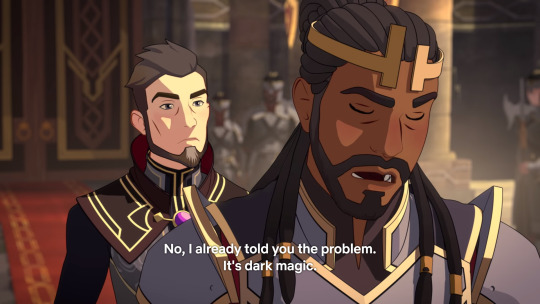

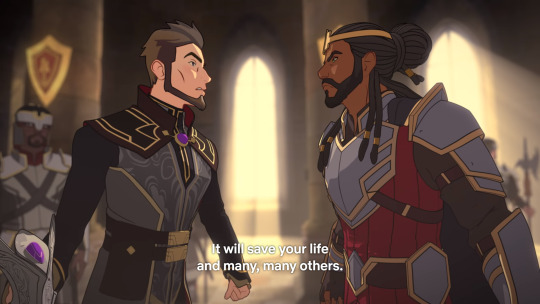
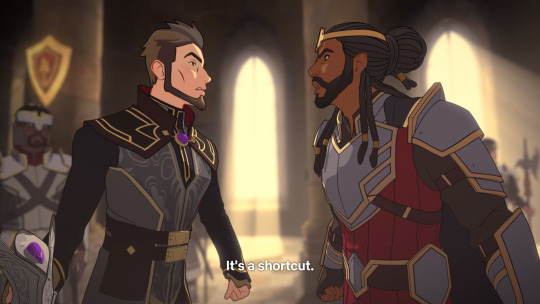
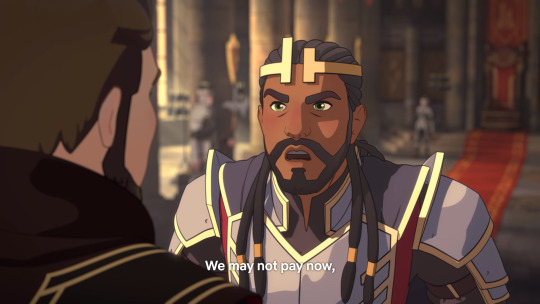
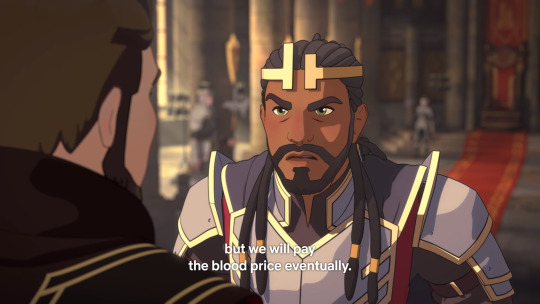
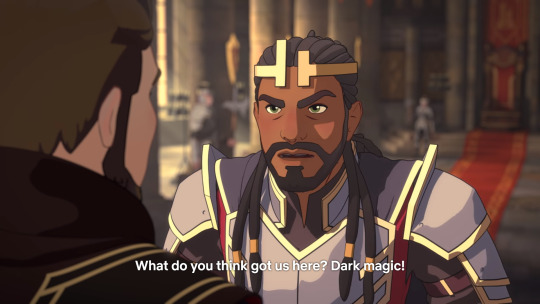
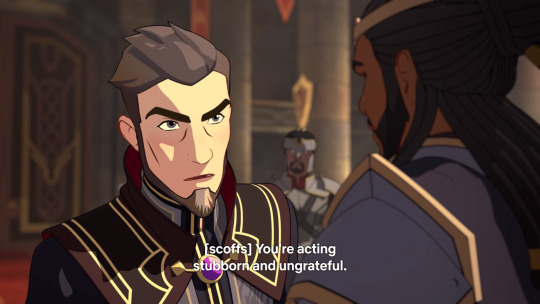
This is further exemplified by when their argument moves to discussion of Azymondias’ egg a few seconds later:
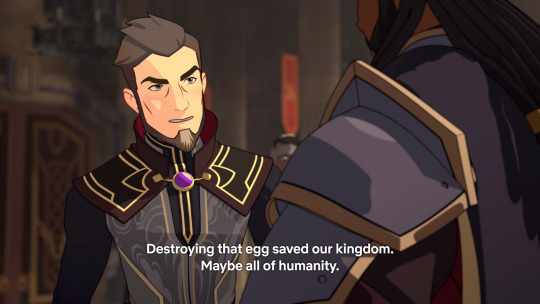

Harrow takes issue with dark magic because dark magic requires killing and sacrifice (the “blood price”) in order to work. Further, he resents Viren for destroying the dragon prince’s egg because, as he points out, it was an egg. It was harmless, there was no reason to destroy it, and yet Viren did so and kickstarted this entire war. In other words, Harrow sees these actions as morally corrupt and Wrong. But Viren doesn’t think that way. Viren thinks that Harrow focusing on morality like this is him being “stubborn” and “ungrateful.” Viren thinks in terms of Harrow, thinks in terms of the people of Katolis; whether or not it’s morally Right to crush (or steal) a dragon egg or kill magical creatures for the sake of dark magic doesn’t concern him at all. He’s instead only focused on what will benefit the people in his community, or those he immediately cares about. (Though I would argue that he values the community of Katolis / humanity more than individuals, which would explain why he’s able to ultimately turn on Harrow . . . but that’s a discussion for another time.)
And this is not the only time we see this behavior and attitude from Viren, either. Viren is all right with ordering the murders of Callum and Ezran, two children, because he thinks that having an adult take the throne will ultimately be better for the people of Katolis. Viren is fine with committing treason and lying to the other royals of the pentarchy because, again, he feels that it’s better for humanity if he can get them on his side, regardless of how he has to go about doing it. He wants to turn down the request for aid from Duren because he feels that will put the people of Katolis at risk of starvation, and later he argues against staying behind to help the wounded because that will put those who are not wounded in danger. Time and again we see that Viren doesn’t operate on a sense of moral ethics, on what is Right or Wrong. We also see that he doesn’t necessarily operate on a basis of what is True or Not, as he’s constantly pushing for reality to mold to what he wants it to be, rather than accepting the Truth that is right in front of his eyes. Viren sees focus on such abstract concepts to be impractical at best, and dangerous at worst. He instead focuses on the people in his community and what they need (or at least what he thinks they need, and the best way to provide that).
His daughter Claudia is very, very similar.
Claudia doesn’t focus on community so much as she focuses on individuals. Rather than feeling loyalty to the community at large as Viren does, Claudia instead feels a very intense, personal loyalty to those that are within her inner circle. This doesn’t mean that she doesn’t care for people at all, because if she has to choose we’ve blatantly seen that she will value the life of a human over the life of a magical being (see: briefly panicking when she thought Soren was going to kill Corvus, versus cheerfully saying they’ll chop up the red dragon and take her back to Katolis in pieces). But it is to say that Claudia favors those within her inner circle far more than those outside of it, and that she favors loyalty toward those people more than anything else, and certainly over a sense of Right or Wrong. The truest example of this comes from her reaction to Callum’s dislike of dark magic, which isn’t very dissimilar from the disagreements and arguments we see Viren and Harrow have over it:

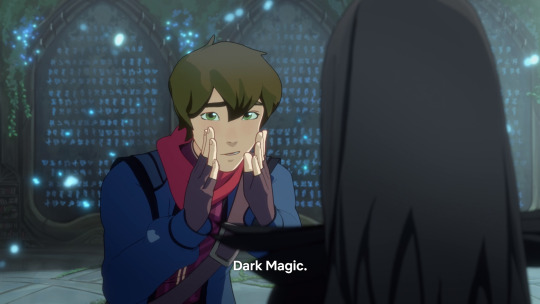
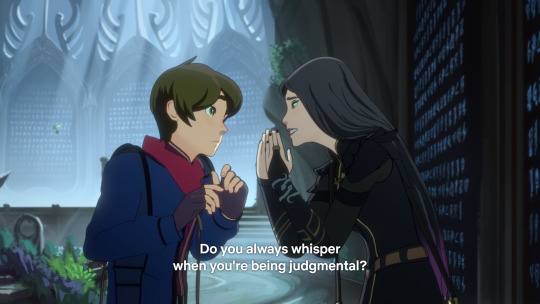

And then, after Claudia has her infamous “take creatures that are born with magic and squeeze it out of ‘em” line, and Callum looks disturbed:



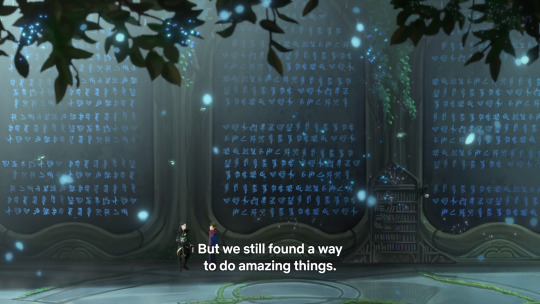
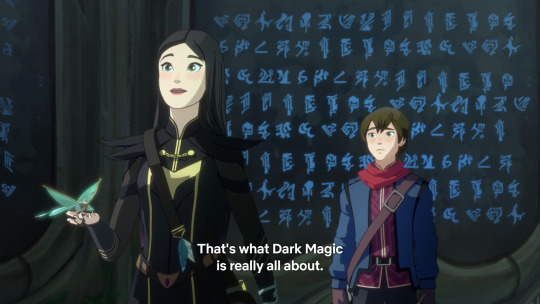
Callum takes issue with “squeezing” magic out of living creatures. He doesn’t want to do that, he feels it’s Wrong. But Claudia isn’t concerned with Right or Wrong. In fact, she’s irritated by the fact that Callum is judging her for something that she thinks shows the potential and ingenuity of humanity. Similarly to how Viren disliked when he felt Harrow was stubbornly pulling the morality card over something he saw as being “clever, brilliant, and practical,” Claudia grows irritated with Callum for judging her over finding a way to do magic despite not being born with an arcanum inside her.
The disagreement she has with Soren earlier in the episode also reflects where her morality lies:




Claudia does pull the “it’s wrong” card against Soren, but she does so not because he lied, exactly, but because he lied to their friends. When Soren counters that Claudia “squashes innocent creatures to make magic pancakes,” her reaction is to shrug. It doesn’t matter that magical creatures are not required to make pancakes. She doesn’t see anything wrong with taking the shortcut. But she does take issue with lying to her friends, because those are people she cares about. This comes to a much bigger head later in the season when she chooses to save Soren over securing Azymondias, because at the end of the day her loyalty lies more to her brother than it does to her mission (or, one could say, more to her father, but that’s a discussion for another time). Nonetheless, what we see time and again is that Claudia is not concerned with morality, with Right or Wrong. When she does bring up the concepts, it’s in relation to those she cares about (she sees bringing the princes home as being “right” because it’s what her father, Viren, wanted her to do; she sees lying to them as being “wrong” because they’re her friends, and so on). Instead, she’s motivated by people. Her friendships with the princes, her love for her father, her love for her brother. Everything else is secondary, and this is something she certainly has in common with her father.
2.) Temper, temper.
Though this similarity is on a smaller scale than the above, both Viren and Claudia have tempers that range from little snaps when they’re prodded at while frustrated, and full on tantrums that rage when they feel backed into a corner.
We see that both of them are prone to snapping when irritated in season one. For example, when Viren has his first argument with Harrow and Claudia rushes up to him afterward, tapping her nose, he takes his frustration out on her with an irritated snap, despite her having nothing to do with it:


Likewise, Claudia snaps at Soren when they’ve reached an impasse trying to find the princes, even though he was asking a perfectly logical question:
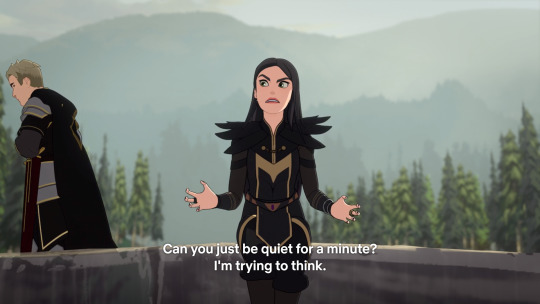
But their tempers are best showcased in season two, when each of them has reached their limits. After a spell that required injecting potion into his eyes to let him see the truth of Aaravos’ mirror doesn’t work, Viren has a tantrum that results in him destroying his secret chamber:
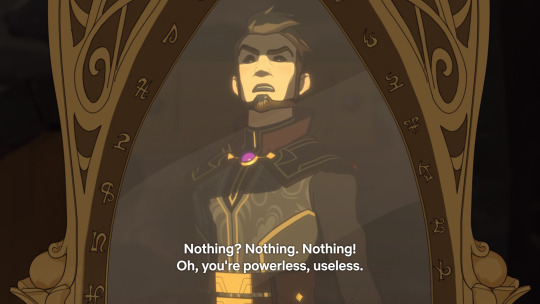



Similarly, when she grows frustrated that there is seemingly no way to cure Soren’s paralysis, Claudia has a tantrum that results in her destroying the hospital room before she’s “escorted” from the premises:


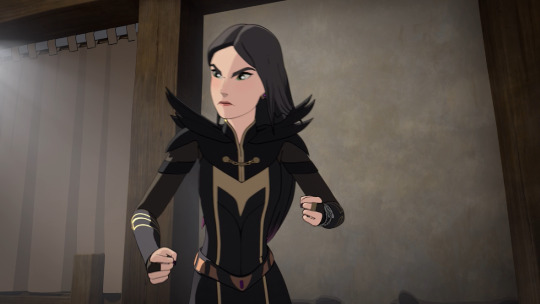

While it’s true that Claudia was once again motivated by her loyalty toward a loved one, whereas Viren’s tantrum was motivated by a sense of his own failure, both are still prone to room-shattering, violent tantrums when they don’t achieve their desired ends.
3.) They believe they know what’s best, for everyone.
One of Viren’s most defining qualities is his pride. Despite his scornful assessment of Harrow’s own pride back in season one, the fact remains that Viren is very convinced that he alone knows what’s best, and that everyone else is stubbornly wrong when they disagree with him. He believes he knows what’s best for Katolis, what’s best for humanity, and if Harrow disagrees, then Harrow is being stubborn and prideful; if the council disagrees, they’re being stubborn and short-sighted; if Aanya disagrees, it’s because she’s an inexperienced child, and so on. It doesn’t matter if others give Viren reasons for their disagreements; he still believes that he knows what’s best and refuses to listen to what others want if it goes against what he thinks is best for them.
And though we haven’t seen as much of it yet, we saw enough in season two to see that Claudia is very much the same way.
After Soren is paralyzed, he comes to terms with it. In fact, he tells Claudia that in a way, he’s relieved this happened, because now he doesn’t have to follow Viren’s order to kill the princes. But although Soren has come to peace with his newfound disability, and though he tells Claudia that he has aspirations to be a poet, she’s not having it:

She ends up slaughtering a fawn to use in a dark magic spell to restore Soren’s mobility, despite the fact that not only was he at peace with his disability, but he was actively screaming in pain while she was doing the spell:
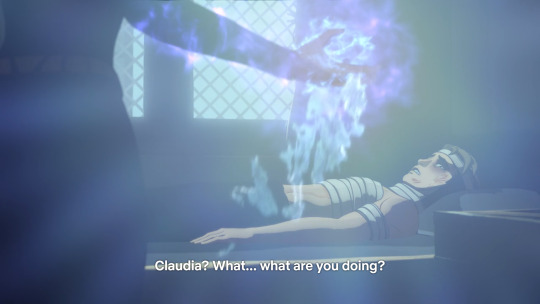

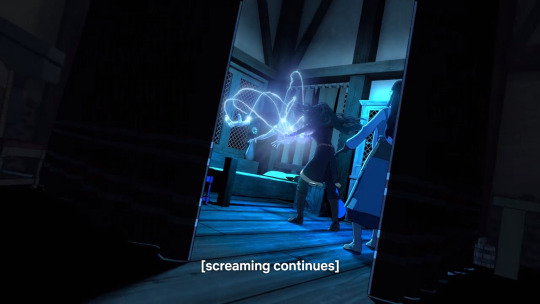
She didn’t ask him if this was what he wanted, she didn’t ask him if it was all right for her to do it. Despite his fear, despite his screams, she continued. And yes, he ended up being thankful for the ability to move again . . . but his feelings weren’t really a factor in Claudia’s decision making:


Much like how Ava didn’t need four legs to be okay, but rather for others to be okay, Soren didn’t need his mobility back to be okay. Claudia needed him to have it back for her to be okay. And if Viren really did put Harrow’s soul in Pip’s body, then he did not do that for Harrow’s sake. He did it for his own.
While these are three primary similarities that I picked up on between Viren and Claudia, I’m certain there are more bubbling beneath the surface as well, that will rise to the top as conflict increases in future seasons. Despite Soren being the one to make the choice to stay with Viren, it’s Claudia who truly takes after him, in more ways than simply their shared love of dark magic (which they love, it should be noted, for the same reasons). One thing is very clear to me: If Claudia does decide to rebel against Viren, it’s not going to be because she feels that what he’s doing is Wrong on a morality scale. Instead, it’s going to be because her loyalty to others (namely, Soren) is greater than her loyalty to Viren, as we’ve already seen this season. And though Viren loves Claudia, if he feels that she’s a danger to humanity, he’ll treat her with the same “respect” he treated Harrow and the others. Conflict between them will not come down to a question of Right or Wrong on a morality scale, because neither of them care about that. It’ll all come down to which people they view as being more important. But nonetheless, Viren’s favorite child is like him in more ways than one, and I’m very interested to see where these similarities between them lead in the future.
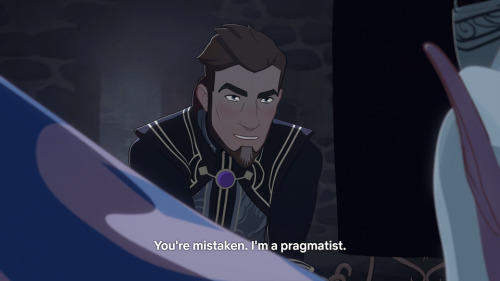
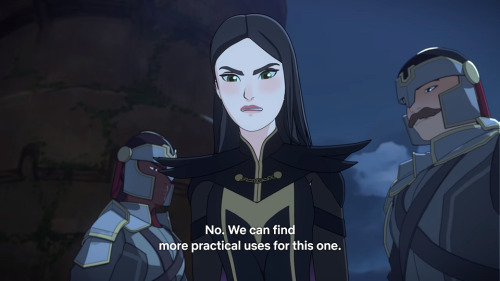
#the dragon prince#claudia#viren#lord viren#meta#tdp meta#i want to do another full rewatch of both seasons#and when i do i may be able to add to this#but nonetheless i see Claudia taking after Viren in *so many* ways#so I had to make a post on it
30 notes
·
View notes
Text
OUAT 4X01 - A Tale of Two Sisters
Awww! The Frozen Arc! It’ll be ICE to see it again!
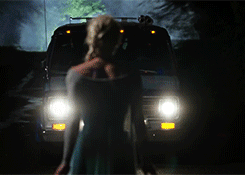
Let’s hope my review is better than my puns! Give it a read below the cut, if you are so kind!
Main Takeaways
Past
I can’t get over how GOOD the casting and chemistry was for the Frozen cast. I’m partially convinced that Disney has machines that construct people from their CG counterparts! XD I feel like the story fro this episode is perfectly good. This segment really just had to show off that it understood the Frozen cast and delivered a story that allowed for the story to continue in an engaging way, and I think they did a pretty solid job of it!
Present
”Your intentions don’t matter.” While this phrase is often a good point in terms of actions mattering more than intentions, it’s not here. While yes, I know that this ends up being Zelena, at the time, Emma was saving an innocent woman. I get that Regina’s upset and it makes sense for her character to be upset in this situation, This is a hard arc to watch. That said, I do like that Emma stands her ground here. While she’s sorry she caused Regina pain, she won’t apologize for sparing Marian. “That was the person I was, not the person I am.” But the thing is, you still have to answer for the sins of the person you were. The harm she caused didn’t go away because you’ve done better. It honestly frustrates me to see Regina deflecting back to this aspect of her character. That said, as I’m often one to defend Emma from criticisms against her walls popping up all the time, I want to make the effort to do the same for Regina. And I do think that not blaming others for her mistakes is the general trajectory of her character, and this arc is interesting because we see a more redeemed Regina put in a similar situation to the very actions that made her The Evil Queen to begin with. The immediate show of growth honestly helps here too. It’s clear by the end of the episode that Regina won’t go back to her old ways, and the engaging part now is how she reconnects with the rest of the mains.
I gotta say, I remember LOVING the initial idea of Marian coming back to life and I still do in the universe where more had been done with it. So much of Storybrooke has forgiven Regina because they’ve seen her take on Pan’s Curse and Zelena, but here comes someone who not only hasn’t seen this redemption, but has a strong connection to Regina’s boyfriend. The conflict there just SCREAMS of potential for all involved. Marian’s got a strong personality, Regina would get to truly prove her redemption to someone with no faith in her, and Robin would get a more intricate conflict and potential for deeper characterization that could contribute to him growing as a member of the main cast. And...nothing like that really happened. I think watching this episode tends to open up old wounds for me because this was an arc that I really looked forward to getting into the meat of and because the meat amounted to that found on a chicken’s foot, I can’t say that I’m that happy.
Basically every line at Neal’s grave had me filled with feels! What a beautiful and touching goodbye from Rumple to his son. It’s such a powerful moment. When it comes to Rumple this episode, they set him up so much to make the ultimate change just to not. Now, in the context of the episode as a vacuum, that’s fine and is a pretty classic Once-y twist. However, I feel like in the service of the arc as a whole, it would’ve been better maybe to show more of the reasons why the Sorcerer’s Hat was so tempting, and if not here, then in another episode. The closest we’ll get is Rumple’s speech to Regina in “Heroes and Villains,” which merely touches upon the effects of dying, being a slave at Zelena’s hands for a year, and losing Bae. And look, I like his declination back to villainy for that reason. Bae was his moral compass -- the person who had just enough doubt and love for Rumple that he would be able to keep Rumple on the path of good just with his willpower and lack of full trust -- and losing him at the end of what amounts to a torture conga is the kind of thing that would cause him to get more slippery with his morals. Belle in certain contexts can be easy to fool and I can see those small rationalizations build up in a way that would match up with the following arc.
”I know you, cause you’re like me.” Not to get too shippy, but I feel like the interaction between Robin and Regina in the office where Robin points out their similarities is a character point that should’ve been given more focus. Yes, from an abstract point of view, Regina and Robin are similar because they used to do villainous things, whereas Robin was a thief, Regina murdered, and that’s an entirely different league of villainy. And I swear I’m not trying to put Regina down here, but I think that difference is one that should be a focal point of their dynamic. Robin went through a redemption arc of his own in a way, and seeing him try to pass on those tactics and fail because they’re not compatible with Regina’s brand of villainy and grow from that to have a better understanding of Regina and take on a different approach to helping her. Getting into the meat of that and establishing those differences could’ve made them stronger for me.
I hate the way “monster” is used in this episode. The context of the episode frames “monster” as something undeserved being thrust upon someone, applying to Regina and Elsa. However, in the context of the episode, Regina’s being called a “monster” by Marian, someone whose most recent memory of Regina is saying that she’ll be happy with her head upon a spike and Marshmallow is being called the monster in Elsa’s case, though she attributes that as an extension of herself while Marshmallow is literally attacking a town. Just...this isn’t like The Beast being called a monster when he’s not attacking anyone and I don’t feel like the framing was entirely there for it. THAT HAVING BEEN SAID, I do think the retraction of “monster” towards Regina was well deserved! She saved Marian, even with all of that rage in her heart and that’s pretty freakin’ great!
Stream of Consciousness Thoughts
-This opening may have one of the most fantastically created storm. Look at the water and the panic of the crew as they try to fight it off!
-So while I don’t blame anyone from being a little nervous at the possibility of Regina going evil again (She spent half of the scene talking about how being a hero screwed her over and she does try to plot to kill Marian with Sidney in the vault), props to Henry for his faith in her!
-Dab, Elsa! Dab!
-”And once more, I’ve started it with a lie.” That was a really poorly-worded segue. He wasn’t talking about lying in the previous part of that speech and it’s not like he brought up lying about Milah’s “death.” It’s just one line, but it could’ve been better constructed.
-”I’ll spend my life repaying you for that.” Well, you’re not wrong.
-Damn, there’s a really interesting contrast in Robin and Regina’s scenes in the office between the finale and here. In the finale, they were on the floor, relaxed, and touching whereas here, they’re sitting on the couch, stiff as boards, and the distance between them looks more like a chasm.
-Okay! Watching this episode after the auction and seeing everything everyone bid on is hysterical!
-As we’re spending a lot of time in the mayor’s office, I’ve got to say that I LOVE the interior design here. I love the black and white that allows for the colors (Especially the reds) to pop against it. I love the forest-like wallpaper. It’s just so pretty!
-I gotta say, I’m really happy seeing Sidney again. The actor just rocks!
-Breaking and entering honeymoon? Sign me the fuck up! :D
-I need a map of Storybrooke SO badly. For a while, I HC’d the mansion as being closer to the town line, but I guess it’s closer to the docks? Thoughts?
-I gotta say, I think it’s a little dumb having Rumple be able to stop people in their tracks like that and have it only happen again like one or two times.
-Speaking of the auction, kind of weird that the Sorcerer’s Hat never came up in it.
-I really like how The Enchanted Forest was given an actual name. It’s not that I don’t like calling it The Enchanted Forest, but calling it Misthaven makes it feel more like a place with a history and a life to it rather than just...a place.
-”I need my beauty sleep.” Woowww, Pabbie. Way to leave in the rudest fucking way ever! Like, I’m bored, byeee! Your in-laws are there, clearly upset about this! Put in some more fucking effort!
-Anna, I don’t think Elsa’s “making excuses” when she’s the queen and can’t abandon her country!
-One of my favorite jokes that’s so underrated is how the “DO NOT BLOCK GATE EVER” fence just gets fucking stepped over! XD
-That snowman doesn’t even look scared! He just looks annoyed! Someone, make this dude a tiara!
-Nathaniel--I mean Kristoph! It’s you! ...I think watching Crazy Ex-Girlfriend might have made it impossible for me to fully immerse myself into this character.
-Fuck yeah, Marian! Going in for the fight! ...I do wonder. I guess had Regina not decided to save her, Zelena would’ve revealed herself in order to not die.
-”I don’t know what that [Netflix] is but sure.” I love this line so much!
-”Unless...another monster appears and kills me.” ...Welcome to your life, ma boy.
-I’d like to think that during that pause when Sidney wouldn’t appear, he was talking to Ingrid and plotting.
-Damn, Belle! You pull that off! Or rather, I suppose it was pulled off of you! ;)
-RUMPLE AND HIS SEXY ASS ARMS! WE HAVE RUMPLE AND HIS SEXY ASS ARMS! NOT A DRILL.
-...Anna, that’s not how you wear a necklace!
Favorite Dynamic
Emma and Regina. You would think given how I really don’t like what’s to come that this episode would’ve done no favors for me, but honestly, I love Emma and Regina’s dynamic here! As I said before, while I roll my eyes at a lot of the lines given to Regina here, I do think it makes absolute perfect sense -- not deserved, but make sense -- for Regina to be angry at Emma. And Emma is adamant that she doesn’t regret saving her life, but still feels terrible that Regina lost Robin in the process. It’s a very nuanced aspect of this conflict. I also feel like their reactions to their fight were really well written. Emma is trying to live up to both her job as the Savior and her resolve to fight against her walls by trying to find Regina to talk while Regina’s more reserved character aspects kick into high gear and she slinks back to think on the matter.
Writer
Adam and Eddy are our main guys today, as per usual with season openers and they did a great job! In a vacuum, so much of this story is great and sets up a lot of the conflict and mystery of the next half season. And while the rest of the half season doesn’t hit bullseye at every point, they do succeed more often than they don’t.
Rating
9/10. This episode is a little hard to watch in hindsight because of the potential of some things that just really didn’t pan out, BUT within the context of this episode, the initial quality of these arcs is so present and that’s what this review is mostly here to judge. While not balanced in the sense of giving everyone something to do, I do think that there was a perfect balance of character usage. Everyone placement and actions feel right and appropriate for their characters. Finally, I know I’m in the minority, but I LOVE the Frozen cast. They added a nice bit of charm to the episode and made a very memorable first impression.
Flip My Ship - The Home of All Things “Shippy Goodness”
Captain Swan - I really like the CS plot here. Romance, especially after Neal’s death, isn’t the easiest thing for her and especially given what just happened with Regina, she doesn’t want to let herself be happy, but Killian’s making sure that she gives herself that chance. So, also, I always grinned when I saw Emma fall right on top of Killian. I love when that happens with romantic pairings! And their kiss is just fantastic here! Emma is still very much interested and she feels guilty putting Killian on the side while she deals with her feelings and circumstances.
Rumbelle - I freakin’ love the breaking and entering honeymoon! RUMBELLE PORN! Just...that dance. That music. Robert Carlyle’s smile. My only regret is that we had to sacrifice the awesome outfits Rumple were already wearing (Though they make it up later in the bedroom! ;) ) AND SPEAKING OF THE BEDROOM. Yeah, Belle looks pretty freakin’ satisfied with whatever kinky shit they just got up to!
-----
Hey everyone! So, I altered the review style a little bit. I don’t know whether or not I’ll stick with this or return to the old format, but I feel like this was a better way to condense my thoughts. The Season 3 Overview will be posted...at some point, tbh. I don’t know why, but it is really hard to write right now and since I’m already behind, I figured that I’ll just jump into Season 4!
Thanks to the fabulous folks at @watchingfairytales and to my badass boss of a friend @daensarah! Finally, thank you to my loyal readers! Happy holidays to you all!!!
Season 3 Total (9/230)
Writer Scores:
Adam and Eddy: (9/60)
*Links to the rest of my rewatch will no longer be provided. They take posts with links outside of searches and I spend way too much time on these reviews to not give them that kind of exposure. Sorry for the inconvenience, but they still can be found on my page under Operation Rewatch.
25 notes
·
View notes
Text
✨ ( mixed ) elements.
LINK. COPYPASTE HOWEVER MUCH YOU WANT ( THE RESULTS ARE LONG. )
✨ ICE! (WATER+EARTH)
Ice is cool, calm, collected, logical, and abstract. It combines the calm, serenity, insight, adaptability, and wisdom of Water with the order, consistency, loyalty, and practicality of earth. They are creatures of cold, crystalline beauty – elegant and unapproachable. They are deep, mysterious, and inscrutable – yet they see the rest of the world with astounding clarity. They have a big-picture view of life and tend to be meticulous planners. Ice is also generally a very good judge of character, so long as Ice does not give in to pessimism or cynicism. That is one of Ice’s great internal struggles – the conflict between an intense inner idealism and pessimism about how corrupt the world is.
Ice is exceptionally perfectionistic. Ice is also known for its subtly determined nature. Instead of trying to break through barriers, Ice finds another way. When the barrier is weak or if Ice finds just the right angle, it breaks through with the force of a massive iceberg. Yet against stronger or more aggressive forces, Ice adapts, melts, flows around boulders, through piles of debris, over dams, and even through the smallest cracks. When it finds such small opening, it freezes – expanding and cracking the barrier apart. Ice plans everything meticulously in advance and can be seen as opportunistic since it never lets any opportunity go to waste. Ice is very independent and often stubborn, but not aggressive or bossy. Rather than try to force the world to conform to itself, it bends and moves to suit the circumstances, subtly influences the world from the shadows, or else it simply leaves.
Under stress and pressure that would break anyone else, Ice still stands like an ancient, unconquerable glacier. This ability to think well in both abstract and concrete ways makes Ice a natural planner. Everything in Ice’s life goes to serve The Plan: an extremely complex life-long plan for success that incorporates every foreseeable variable and contingency. Often, Ice begins making The Plan while still a small child and continues to refine it and re-work it across his or her life. Their ability to predict the future is mysterious and can be either inspiring or terrifying depending on whether Ice is a friend or enemy. Ice generally uses its towering intellect to solve problems, express deep truths, create inventions, or unravel the mysteries of the universe rather than make money or get fame. Fame is of very little interest to Ice.
Further, Ice is very emotionally withdrawn. While Ice usually has a rich, complex internal world of emotions, Ice is very poor at expressing those emotions to others – and some Icy people may even have difficulty reading the emotions of others. Ice tends to be distant, remote, and very difficult to read - often having a constant poker face or unintentional icy death glare. Even when emotions are expressed, getting the right words out with the right vocal tone is frustrating. This often tends to push away the very people Ice wants most to get close to. This over-abundance of caution, difficulty improvising, and difficulty expressing emotions are Ice’s three great weaknesses. Yet for anyone who manages to get close enough to Ice to make a real emotional connection, they will find Ice to be very loving, devoted, and absolutely loyal. As a general rule, anyone who earns the love or friendship of Ice will enjoy lifelong, unbreakable commitment and they will get the rare treat of enjoying the warm and compassionate heart at Ice’s core.
✨ CORE STRENGTHS. ice is calm, imaginative, wise, patient, adaptable, observant, artistic, idealistic, rational, practical, dependable, fair-minded, respectful, honest, loyal, and insightful
✨ POSSIBLE WEAKNESSES. when immature, Ice might be depressed, pessimistic, passive, indecisive, self-loathing, overly cautious, unsocial, shy, stubborn, bitter, judgmental, callous, excessively serious, or withdrawn from reality.
✨ TAGGED BY. stolen from @bloodfcst xoxo
✨ TAGGING. steal it
#[ — HEADCANONS; ]#[ — MEME FILL; ]#i was gonna cut some of this but like... all of it /#literally every single last piece of this /#is james /#i should just throw out his bio and put this there instead /
2 notes
·
View notes
Text
✨ ( mixed ) elements.
LINK. COPYPASTE HOWEVER MUCH YOU WANT ( THE RESULTS ARE LONG. )
✨ ICE! Water/Earth.
Ice is cool, calm, collected, logical, and abstract. It combines the calm, serenity, insight, adaptability, and wisdom of Water with the order, consistency, loyalty, and practicality of earth. They are creatures of cold, crystalline beauty – elegant and unapproachable. They are deep, mysterious, and inscrutable – yet they see the rest of the world with astounding clarity. They have a big-picture view of life and tend to be meticulous planners. Ice is also generally a very good judge of character, so long as Ice does not give in to pessimism or cynicism. That is one of Ice’s great internal struggles – the conflict between an intense inner idealism and pessimism about how corrupt the world is. Ice is exceptionally perfectionistic. Ice is also known for its subtly determined nature. Instead of trying to break through barriers, Ice finds another way. When the barrier is weak or if Ice finds just the right angle, it breaks through with the force of a massive iceberg. Yet against stronger or more aggressive forces, Ice adapts, melts, flows around boulders, through piles of debris, over dams, and even through the smallest cracks.
When it finds such small opening, it freezes – expanding and cracking the barrier apart. Ice plans everything meticulously in advance and can be seen as opportunistic since it never lets any opportunity go to waste. Ice is very independent and often stubborn, but not aggressive or bossy. Rather than try to force the world to conform to itself, it bends and moves to suit the circumstances, subtly influences the world from the shadows, or else it simply leaves. Ice knows when to withdraw and leave a hopeless organization, pointless debate, or harmful relationship. Solitude is natural and comfortable for Ice, so it very capable of leaving toxic situations behind and not looking back. This tendency to choose an isolated lifestyle may be in reaction to past hurt or betrayal or it could just as easily stem from being highly introverted. It often views society as a whole as being cruel, stupid, chaotic, or threatening. Ice is very structured, orderly, rational, and logical.
They are punctual, organized, detail-oriented, planned, and are excellent at either creating or running vast, complicated systems – whether for business, politics and other practical concerns or for philosophy, religion, science, or other more abstract pursuits. They have both the creativity and wisdom to create as well as the practicality and diligence to administrate. They are strong and stable, honest and loyal, fair-minded and rational, orderly and reliable. Under stress and pressure that would break anyone else, Ice still stands like an ancient, unconquerable glacier. This ability to think well in both abstract and concrete ways makes Ice a natural planner
Emotionally, Ice is the most introverted of all the elements or element combinations. Ice has strong feelings and ideals, but has great difficulty expressing them. Due to the fear of an embarrassing emotional outburst, Ice generally suppresses unwelcome emotions like anger, sadness, or fear. Ice may express positive emotions, but even then usually in a controlled way. This can cause negative emotions to build up and churn inside, magnifying them over time. Sadness, fear, and bitterness tend to be especially strong. If not deal with in a healthy way, this can lead either to sudden outbursts releasing days, weeks, or even years of frustration all at once. Ice’s wrath is rare, but terrible - especially if Ice believes the object of its anger deserves it. However, Ice may just internalize their emotions even further, withdrawing into themselves until they begin to view all the world as a hostile, threatening “other.” Sadness, fear, and bitterness are Ice’s negative emotions.
✨ Core Strengths: Ice is calm, imaginative, wise, patient, adaptable, observant, artistic, idealistic, rational, practical, dependable, fair-minded, respectful, honest, loyal, and insightful
✨ Possible Weaknesses: When immature, Ice might be depressed, pessimistic, passive, indecisive, self-loathing, overly cautious, unsocial, shy, stubborn, bitter, judgmental, callous, excessively serious, or withdrawn from reality.
✨ TAGGED BY: @softestmood
✨ TAGGING youuu.
2 notes
·
View notes
Text
blog 08 - neuromancer

So as an introductory note, I’m actually quite a big fan of cyberpunk. I’m a hobbyist DnD player and the first campaign that I’ve Dungeon-Mastered for was actually a simplified version of Shadowrun that I wrote all the backstory and lore for. It’s in what I would call a “sequel” right now that I’m very much enjoying. So bla bla bla I was excited to get to Neuromancer this whole time because I’m a genre fan.
a brief primer to cyberpunk
So western Cyberpunk owes its roots largely to the detective fiction genre-- most notably the hardboiled detective archetype, a darker western interpretation of your Sherlock Holmes type who is usually a jaded antihero that works for money, but still has a sense of justice deep down. You see this more reflected in Blade Runner than you see it in Neuromancer’s Case, but there are still a number of correlations (Funnily enough, Neuromancer and Raymond Chandler’s The Big Sleep both end on nearly the same line-- “He never saw Molly again.” and “...and I never saw her again.” respectively.) Interestingly enough, Case kind of spawns his own kind of cyberpunk hero trope-- the rebellious hacker, seen in Neo.
If detective fiction owes itself to the inescapable aura of The Great Depression, then cyberpunk owes itself to the Reagan administration. Cyberpunk’s whole thing, at least in the west, springs forward from the fear of unregulated corporate growth in tandem with the rise of technology, and what the mixture of the two might bode for humanity at large. Both Neuromancer and Blade Runner owe their entire aesthetics to the vision of a world taken over by neon advertisements, bereft of nature, replaced by plasticity.
Now, why the primer? Well, I think it’s important to preface the discussion of this novel with the idea that cyberpunk is a deeply political genre in a way that not many other genres inherently are. (All fiction is, of course, inherently political, whether intentional or not, but most genres don’t regularly feature as much political charge as cyberpunk, is what I mean.) Neuromancer is politics from an era before most of us in this class were born, and as such, atop being a seminal work of genre fiction, it’s a lurid look into what the landscape looked like in the 80s. We are living now in the times that 80s Cyberpunk once called “the future”-- and, well, what does it look like for us? Are we living in the Urban Sprawl?
not quite
Our dystopian future is significantly more...mundane than coffin hotels and the television sky over Chiba. You might say we got all the corporate deregulation and none of the glimmering aesthetic slickness of cyberpunk-- we really are living in the worst timeline. If i’m going to have to labor under capitalism for the rest of my short life, couldn’t I at least have a slick pair of mirrorshades?
the text
There’s a lot about Neuromancer to like. It earned its reputation wholeheartedly-- it is definitely the legendary cyberpunk novel that it is well-known for being. Its writing style can often be abstract at the same time that it’s luridly detailed, and it uses strange and interesting words to create vivid images in the reader’s mind of this foreign landscape of the Sprawl. It uses a lot of “old world” associations to lend deeper weight to its descriptions (the Tank War Europa game comes to mind in tandem with the Screaming Fist operation that looms over the plot).
The book doesn’t shy away from the visceral nature of its own plot and setting-- drug binges and cramped love affairs in coffin hotels, fear and violence are all described in visceral detail that grounds the book hard in its reality while simultaneously indulging in a sort of dream-like surreality. I really admire the ways in which Gibson writes physical sensation whether it comes to the sex or the pain or the weirdness of cyberspace. The introduction of the novel sort of failed to catch me until Gibson went into detail about Case’s harrowing journey after losing his ability to jack into cyberspace and the intense, surreal affair with Linda Lee. Perhaps my biggest issue with the writing of Neuromancer is, however, Gibson’s tendency to throw a lot of world-building terminology at you really fast. Nothing bogs down a fictional story more than having to pause to wonder what certain words mean.
Describing cyberspace during a time in which VR wasn’t even a thing yet had to have been a challenge and a half, but Gibson found interesting ways to visualize the experience, and coined interesting terminology for it (ice and icebreakers, most notably). The Sense/Net bits are also pretty cool, but I’m also biased because anything that gives Molly Millions more screentime is just the best thing.
Did I mention Molly is my favorite character? I just can’t get over her. It sucks that her and Case break up in the epilogue, but it also feels fitting in a weird way. She really struck me as a standout character for a woman in a cyberpunk novel-- she’s an active player in her own sexuality, she’s violent and the stronger of the two between herself and Case. She has a sort of unapologetic way about her that feels very fresh even today. The first time Case uses Sense/Net to see through her eyes, I was hit in an unexpectedly hard way by the description of people in a crowd moving out of the way for her-- for most girls in real life, that’s a fairly unheard of experience, and to me, as a female reader, it did a lot to establish to me just how powerful she is.
That being said, this is a good place to segue into the conversation you know my Obnoxious Feminist Ass has been waiting to bring up.

cyberpunk vs women
You can tell a lot about a person’s base assumptions about the world by the way they talk about people in their works of fiction. Now when I say “base assumptions” I don’t mean their political leanings, I mean something that’s on a deeper, more subconscious level-- in this way, base assumptions are inherently neutral in a way, they’re incapable of being truly malicious, even if they’re harmful, because they’re just the base coding of how a person regards things inherently.
What I’m getting at is that at the time of writing this book, I don’t think Gibson had much of a regard for women at all. When the first mention of women in your novel is calling them whores, I’m going to be forced to assume both that you don’t like women very much and that women are primarily sex objects to you-- or at the very least that women factor into your view of the world in a very marginal way that is largely informed by porn culture. Now, let’s suppose that maybe it’s actually the POV character Case that’s just a raging sexist-- that theory might hold water if this were a character trait that is brought up as a flaw, or indeed, if it were really brought up at all in his personality, but it’s not.
To my great frustration, in the Neuromancer world, it seems like “whore” is about the only job available for women! Who knew the job market would shrink in such a way? Now, perhaps you could argue that Gibson was actually trying to make a point about the way in which porn culture commodifies women into sexy leg lamps for male consumption, and I won’t claim to know his intent, but to me, it doesn’t really seem that deep. It seems like to me that, to Gibson, women being mostly vapid sex workers in his dystopia is a foregone conclusion-- he didn’t think about it that hard, that’s just his stereotypical image of what women in an criminal underbelly do.
This problem of a lack of regard for female perspectives in cyberpunk narratives that largely concern themselves with themes of objectification and oppression under capitalist systems and the regurgitation of harmful sexist tropes certainly isn’t exclusive to Neuromancer. Cyberpunk is a economic-political type of genre, so oppression in the genre tends to fall upon class lines rather than race or gender lines-- and perhaps, this could occur in a far flung future in which capital manages to supersede bias, however, I can’t help but feel that this is a lazy way to write a political narrative. Blade Runner, Blade Runner 2049, and The Matrix all have distinct problems with addressing the idea of intersectionality when it comes to the ways in which ones gender and race plays into their role in a capitalist system.
Cyberpunk, for all its shining successes as interesting fiction and pointed political commentary, totally fails in the regard that it co-opts the struggle of lower-classes and applies the romanticized aesthetic to white male characters completely unironically. (You can read a pretty good take on Dystopias and post-racialism here.)
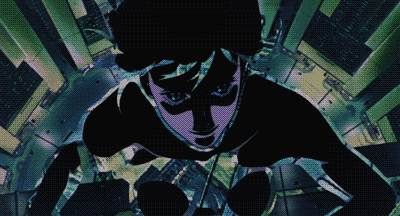
east versus west
So, when I went over the primer to the rise of Cyberpunk earlier, I left something out (on purpose!). During the 80s, there was another prime ingredient to the mix of the nascent genre’s formation: the rise of Japan as a technological leader in the global market. Before World War 2, and indeed, during it, American’s conceptualization of the future, was, well, American. They viewed themselves as the originator of innovation within the world and the blueprint from which the rest of the world should be based. However, this all changed in the post-war era as Japan began to participate in the market, leaving behind their isolationist ways-- suddenly, Japan was what the vision of the future looked like in American imagination-- the Tokyo urban sprawl.
The imagery of Japan is ubiquitous in western Cyberpunk, whether hardcore or or softcore or simply an incidental portrayal of futurism. Disney’s Big Hero 6 features San Fransokyo, San Franciso and Tokyo jammed together complete with neon signs in Japanese letters. During the 90s, Marvel launched Rampage 2099 and Spider-man 2099, both set in glittering neon cityscapes. The series Firefly featured a strange universe in which everyone seems to speak Chinese pidgins (but there’s no Chinese people in the show, funnily). MTV had Aeon Flux, a U.S. take on anime. Even movies like Total Recall borrowed the bright neon flavor. Video games such as Deus Ex and Cyberpunk 2077 feature these influences heavily, with less-bold-but-still-there influence being seen in games like Remember Me and Detroit: Become Human.
There’s an interesting cultural exchange going on between the east and west when it comes to Cyberpunk, as the 90s were rife with cyberpunk fiction in both places-- The U.S. saw The Matrix (which was inspired by Ghost in the Shell, as admitted by the Wachowskis in a phrasing that I find really annoying as an animator: “We want to make that but for real”.), while Japan had the seminal Ghost in the Shell and Akira. It’s interesting to note the stark contrast between western and eastern Cyberpunk-- eastern Cyberpunk misses entirely western Cyberpunk’s detective fiction roots, for one. For two, eastern Cyberpunk tends to concern itself more with philosophical questions about the nature of the soul in relation to technology and deep-seated cultural fears about weapons of mass destruction and government.
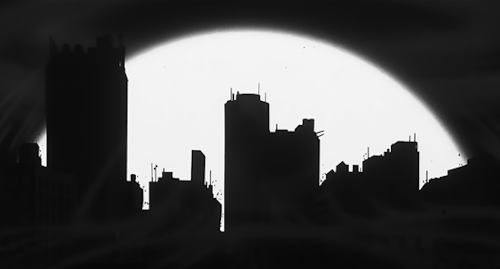
Neuromancer is deeply entrenched in eastern aesthetics-- many Japanese brands are brought up explicitly by name within the model (Mitsubishi, Sony, etc.). Gibson cites the “Kowloon Walled City” of Hong Kong as something that haunted him after he was told about it, and the idea of Coffin Hotels owes quite a lot to it. Gibson is quoted as saying:
“Modern Japan simply was cyberpunk. The Japanese themselves knew it and delighted in it. I remember my first glimpse of Shibuya, when one of the young Tokyo journalists who had taken me there, his face drenched with the light of a thousand media-suns - all that towering, animated crawl of commercial information - said, ‘You see? You see? It is Blade Runner town.' And it was. It so evidently was.“
One of Neuromancer’s primary settings is The Night City, a supposedly gaijin district of Tokyo on the bay-- this...sort of explains why there don’t seem to be a lot of Asian people in Asia, but the issue still stands. This isn’t a game-breakingly “I wouldn’t recommend this book” bad case, but it is something that I felt I should point out. Neuromancer is a foundational work to the genre, which means that not only are its successes carried over, but many of its flaws as well. Now, I don’t want this cricitism to sound like I think William Gibson is a raging bigot or anything-- I really don’t! I follow him on twitter and he’s a perfectly likable guy, actually. Problems aside, I really enjoy his work.
conclusions
Going into the future, I don’t think Cyberpunk is going away anytime soon, and certainly much of it owes its roots to Neuromancer. With shows like Altered Carbon and games like Cyberpunk 2077 on the horizon, I’m interested to see the ways in which our current economic political climate may effect what our vision of a technological dystopia may look like. Cyberpunk is easily one of the most interesting genres of fiction, and if you haven’t looked into it deeply, I highly recommend checking it out.
2 notes
·
View notes